 Coleman Kaserne, Germany - CCB We arrived in Bremerhaven, Germany in June 1956 I think, right about then anyway, and were put on a troop train and headed towards Frankfurt Germany, where our 3rd A.D. Headquarters was to be located and then on East to our base in Gelnhausen. I believe CCA and Headquarters had preceded us and were already in their areas. Here's photo of Bremerhaven embarkation point. 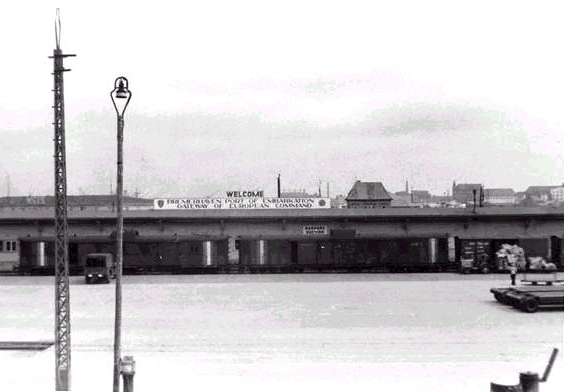 While riding the train to Frankfurt we slept one night then arose the next morning and were fed breakfast served by waiters in a dining car on the train. The meal was my introduction to Germany. As we were finishing the meal, our waiter, a German National, came around and asked us, I thought, to leave what we didn't want by the plate when we were done. They had taken all my money when we got off the boat and gave us military script to use in it's stead leaving in my pockets about 17 cents in American coins so I started digging them out thinking that was what the waiter was referring to and one of the German guys in our outfit said "No I don't think that is what he means." I was too slow catching on so our guy explained that the waiter was referring to food on the plate not money beside it. When I finally understood this alien thought, it was too late, I had eaten everything in front of me. I didn't realize that things were that bad in Germany even 10 years after the war's end. I felt very uneasy about that and saw instances later that verified my queasiness. As mentioned, we had some Germans serving in our company, at least 3-4 of them, generally trying to serve the 5 years so as to get American citizenship. One of them, Tausche, was a machinist in our company and my buddy. The train pulled into our town, Gelnhausen, Germany, later that same day, I think. It was afternoon when we off-loaded onto buses and went to our post, in Germany called a "Kaserne" and in this instance named for an American WWII hero named Coleman. 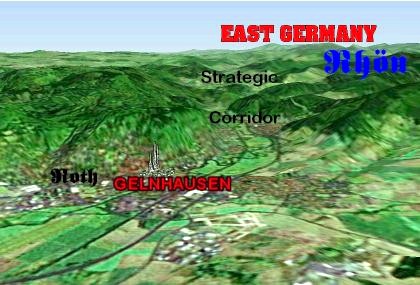 We
were in Germany to help prevent the Russians from
attacking western Europe. Our mission was to guard the
"Fulda Gap" which was an invasion route through the
mountains in the area. There was a cavalry regiment
screening up on the border and the 4th Infantry Division
had a regiment at Gelnhausen when we got there. They
were to leave upon our arrival and we would take over
the area. We
were in Germany to help prevent the Russians from
attacking western Europe. Our mission was to guard the
"Fulda Gap" which was an invasion route through the
mountains in the area. There was a cavalry regiment
screening up on the border and the 4th Infantry Division
had a regiment at Gelnhausen when we got there. They
were to leave upon our arrival and we would take over
the area. Our command, Combat Command B of the 3rd A.D., would assume those responsibilities. We had the largest of three commands in the division and we in Co B ordnance supported a cavalry battalion (83rd) in Budingen, an infantry battalion (29th), an artillery battalion (65th), a tank battalion (33rd) all three in Gelnhausen and the 57th A.A.A. battalion in Hanau. We probably supported the 23rd Engineers there at Hanau, too. So we supported 6 battalions and had lots of work to do. Combat Commands A and C had none of the division's support elements in them. Those support units stuck pretty close to CCB, basically Engineers and an Anti Aircraft Battalion. When we were on the buses headed for Coleman Kaserne, we noticed signs on the streets pointing towards the kaserne and generally saying something about a party. We couldn't figure out what was going on but when we arrived there, our advanced party personnel clued our leaders in. The 4th Infantry Division was leaving so apparently the kaserne commander determined to use up all funds generally allocated to personnel activities instead of turning the money over to the 3rd A.D. All "Company" funds, etc were to be emptied in a big going away bash. The town was full of young women and so forth partaking of the 4th's largess, so to speak. Damnedest thing I ever saw. We tried to settle in but there were some problems. Nothing earthshaking, some of it even humorous. Our officers inspected the mess facility and refused to let our company eat there until they got the place straightened back out (after the festivities). We ate in our mess tent out of doors located just between our barracks and the 33rd Tank Battalion Headquarters until we could bring the mess hall up to some kind of usable standard. The latrines in the barracks was much the same way. The room I was assigned to was getting a new parquet hardwood floor when we got there and we had to double up with the Small Arms Section for a couple days until they had it finished. Boy, it was really nice - Germans really know how to work with wood. Our section had a nice little room on the third floor with two windows that would accommodate about five people and overlooked the "Pond". The 4th Inf Div, though not serving in Korea, had a lot of Korean Veterans in it and they were all older, wiser than we were in the 3rd A.D. where most of us were kids. I was still 18 years old when we got there, for instance. So, yes, we had some cons pulled on us and so forth. I remember one deal where the 4th Inf guys sold a floor buffer to our service section, telling them they had all pitched in and bought the buffer to 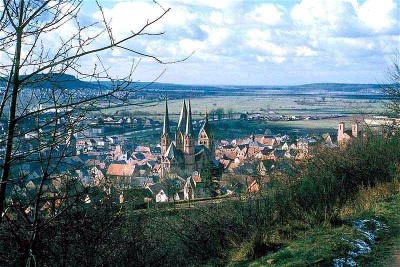 use on the hallways, etc. and they
would sell it cheap 'cause they couldn't take it with
them. I remember some of our guys trying to collect
money for the thing and I told them no way. Most of us
just laughed them off but those guys went right ahead
and paid'm for their own buffer. Well, what the heck do
you expect putting those kids in there with the sharks? use on the hallways, etc. and they
would sell it cheap 'cause they couldn't take it with
them. I remember some of our guys trying to collect
money for the thing and I told them no way. Most of us
just laughed them off but those guys went right ahead
and paid'm for their own buffer. Well, what the heck do
you expect putting those kids in there with the sharks?To the right here you can see a picture of Gelnhausen taken from the hilltop and looking down the Kinzig River valley west towards Hanau and Frankfurt. It is a very nice place, really and some really good people live there. Gelnhausen is a very old town as many are in Germany. The city has at least 3 town walls, or parts of walls now they don't use them anymore. That's concentric walls, spreading outward as the town grew in size. I consider myself fortunate to have been able to not only visit there but to live in the area for 2 years. They have been repairing, painting up the place since the war and they have the place looking really good now, better than when I was there, for sure. The United States spent a lot of money there, the military post and the dependent housing area are almost as big as the town and the military's bar bill would damn near support the German inhabitants. Here is some of the town's credentials .......... 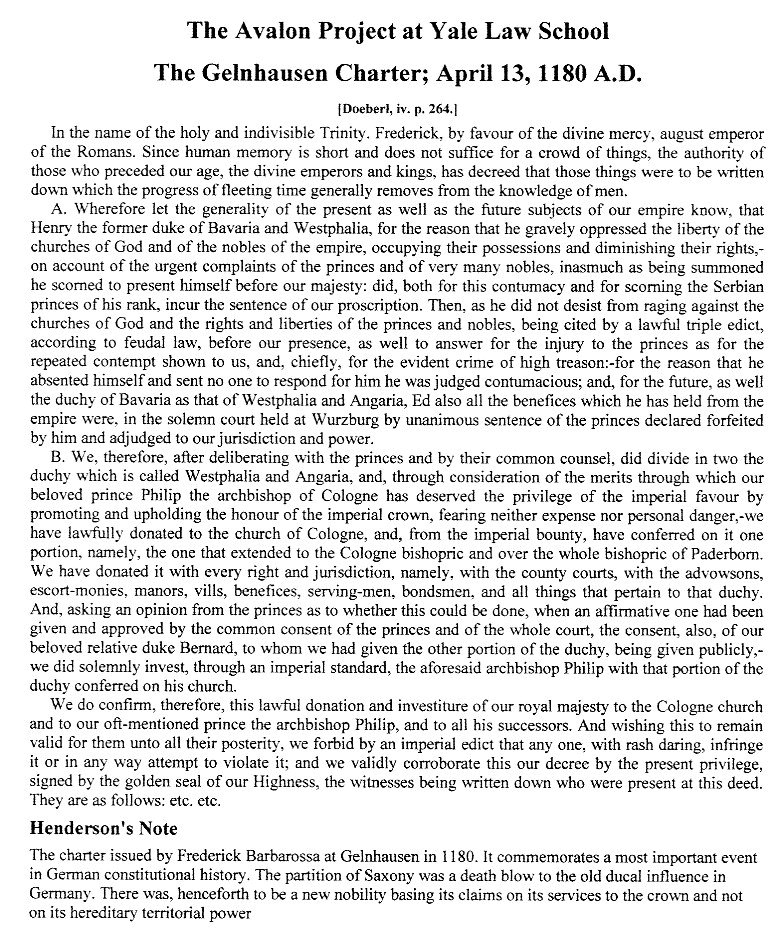 So now you have some idea what Gelnhausen is about. As soon as we were settled in we went to work checking all of the equipment our division was issued and some of it latest and bestest. The latest the army could offer. We got the M48 Tanks and the Self Propelled Howitzer M52 105mm gun. Fine machines and much more mission efficient than earlier models like the M47 Tanks we had at Knox (the beast). Everything was new so we expected few maintenance problems at least for the first year or so. The 3rd A.D. was highly rated as to readiness for combat. We were probably the most powerful striking force on the ground in the world at that time. 'Course, the Russians vastly outnumbered us but what the hay ...... 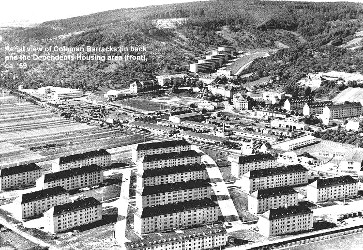 Boy,
you never saw so many Privates running around the
Kaserne. The army was starting to have problems keeping
people and that while all the equipment and everything
was getting more complex and harder for the average Joe
to work on so they started coming out with programs to
help them keep some of their more valuable people. Below
somewhere will be a Co.B picture so be sure and check
the men's sleeves for stripes - they got the barest
sleeves I ever saw. Boy,
you never saw so many Privates running around the
Kaserne. The army was starting to have problems keeping
people and that while all the equipment and everything
was getting more complex and harder for the average Joe
to work on so they started coming out with programs to
help them keep some of their more valuable people. Below
somewhere will be a Co.B picture so be sure and check
the men's sleeves for stripes - they got the barest
sleeves I ever saw.Inducements were promotion and then they came out with what they called "Pro Pay" a bonus paid for just certain jobs. I remember the president signing into law a bill that changed the way rank was determined and passed out to the military personnel. Because our division was put together almost all at the same time, the bill changed promotion to PFC for a large swath of the privates in our company. There were 40 some odd personnel on the set of orders I got promoting me to PFC and I think the other group had close to 60. There was a bunch of us as you can see in our company picture, taken around September, 1956. I think I was promoted to PFC when I had about 14-15 months service in. 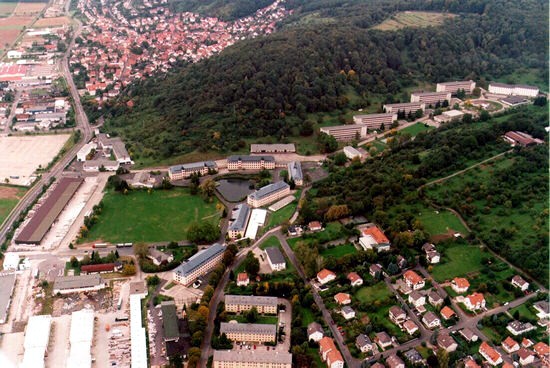 Also, another rank was later re-inserted in the tables. Can't remember just how it went. I think either "staff" or "master" sergeant was re-inserted into the table of ranks. Something jacked most higher ranks up one grade. For instance, I have seen pictures of soldiers just before WWII that showed our sergeant-first-class rank as master or "Top" sergeant ....... only had two "rockers" at bottom of rank emblem on their arm. After the changes, the emblem had three "rockers." Insertion of the "staff" (one rocker) could have pushed the SFC and Master up the rank scale? The pro-pay was one of the more interesting features but few of us got any of that at the time. Above is a photo showing the complete American Project. In the foreground is large area of Dependent Housing and the Kaserne in the background. It was really quite a place. To the right is a photo showing the Coleman Kaserne as it is today - beautiful. The Germans have done a good job on it. Actually they built it for the German Army's P9 Anti-Panzer Regiment(?) in 1936-1938 and the U.S. just added to it, going on up the hill. The highway runs up the left side of the picture and you can see the main gate and the road running across the center of the picture to the right. Our barracks was the first one into the Kaserne on the right. Its the first major building you come to when you go on that road into the Kaserne. There is a pond right in the middle of 6 buildings - this part was built by the Germans in the 1930s. And the different styled buildings on up the draw was built by the U.S. It's very nice place. Most of the photographs I have were taken with cheap black and white film called "fast film". It was fast I reckon, fast to deteriorate is about all. I think it accommodated faster shutter speeds which didn't do me much good, anyway. The quality of the photos I have has degraded to the point some of them are beginning to become unusable. So we'll do the best we can with what I have and some I borrowed. 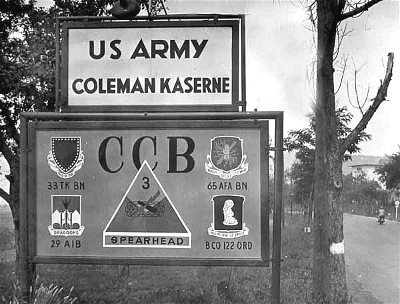 Here is a road sign that stood on the highway just outside of our main gate. In the fall of 1956, I think, most of our unit designations changed. We went from "Armored Ordnance Battalion" to "Maintenance Battalion" and the 29th Dragoons (Armored Infantry Battalion) went to the 48th "Infantry Battalion". The Tankers and Arty guys stayed the same. The Army always screws around this way. Seems like every time they have major commander changes, every thing else is re-ordered too. Apparently the names change with advances in battle tactics. Anyway, the sign told everybody they had found the place and since we were new there, wasn't a bad idea, I guess. However, not too far from the sign was our main gate right on the same road. I don't know how someone could miss the main gate and needed the sign but I suppose there was a reason. 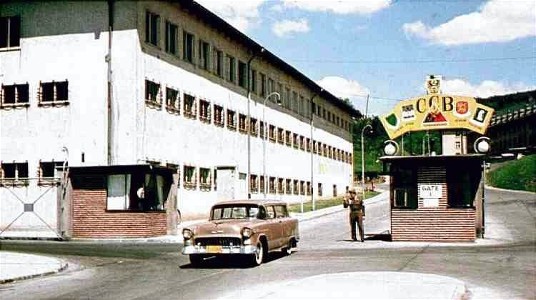 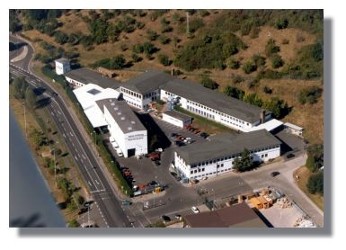 Here is a photo of the main gate
which was on the main road into the Kaserne in which you
can see our battalion's emblem. Just to the left of the gate is our PX (Post Exchange)
area. Services such as grocery store, barber shop, bank,
auto repair shop, restaurant and all of those things was
located there. You can see this area in the Kaserne photo just to the right - just
right by the highway and on the road entering the
Kaserne. Isn't it pretty? The picture was taken right after Germany took control of the Kaserne. I assume it looks pretty much the same today. I'm not sure just how the Kaserne is operated today but it looked to me as if the area was packed with manufacturing, etc. enterprises and the old army barracks are probably used as dormitories and are filled with imported labor. The barracks could be used for offices and such - as an insurance company operation perhaps. They are sure using it all now, anyway. As you enter the gate, you start uphill and the first large building you come to, on the right, was my barracks and the road continues on behind the building until you come to our Command Headquarters building - Combat Command B of the 3rd Armored Division. It's a nice building and most of the pictures I've seen of it doesn't do it justice. 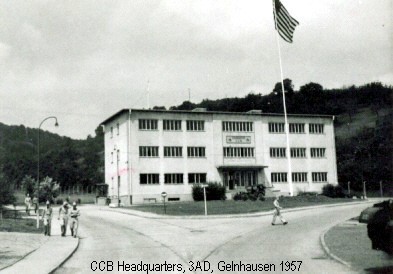 Almost all of the pictures I have show the older buildings. I really don't have any of the newer buildings on up the hill that the Infantry and Tankers used. I don't know if any of the Artillery guys were up there in those buildings or not. Ordnance, M.Ps. and I think a Communications Section bunked in our barracks on the 2nd floor, probably 143rd Signal. The CCB baseball team was billeted in the attic of our building. After we took over, we all ate in this mess hall, shown below ........ 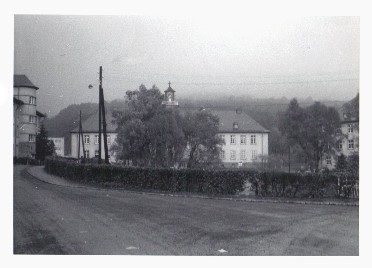 You
can't see much for the tree but that was the building.
We'd walk up there from our building. You
can't see much for the tree but that was the building.
We'd walk up there from our building. We went right past the Hdqrs building for the 33rd Tank Battalion which was adjacent to us on our left when facing the pond as all the buildings did. The 33rd's Hdqrs personnel billeted there. And then there was "The Pond". This was the central feature of the entire complex and looked as if everything was built around it. Here is a partial picture of the pond and you can see the Year 1936 attached to the railing. Our supply sgt washed his new car there and it was setting there drying when I took the picture from the window of my 3rd floor room. I doubt the supports would be visible but there was a diving board installed at one time. By viewing the entire complex you can 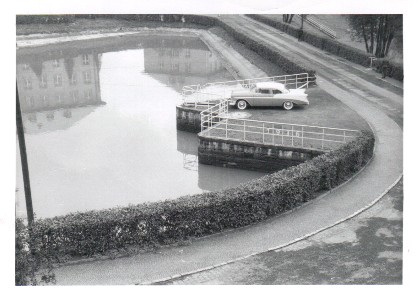 understand why a
young man might have wanted to join the German
Army. understand why a
young man might have wanted to join the German
Army. The large grassy area just below the pond was our baseball field, naturally, and we generally had a pretty good team. Being right next to the field and being in close proximity with the players we were some of their best fans. We even had a couple guys good enough to play on the team; Rickard and Goodrich. The water in the pond was not well cared for, wasn't as clean as it might have been. As far as I know, no one in our army swam in it. However; there was a time when I saw a demonstration of a tracked M59 Personnel Carrier entering the pond and maneuvering around in it. The pond was very small but that darn P.C. floated and did all the things they said it'd do. And here is a picture of B Co. taken right after we got settled in. The photo was taken up by CCB Headquarters Building ..... 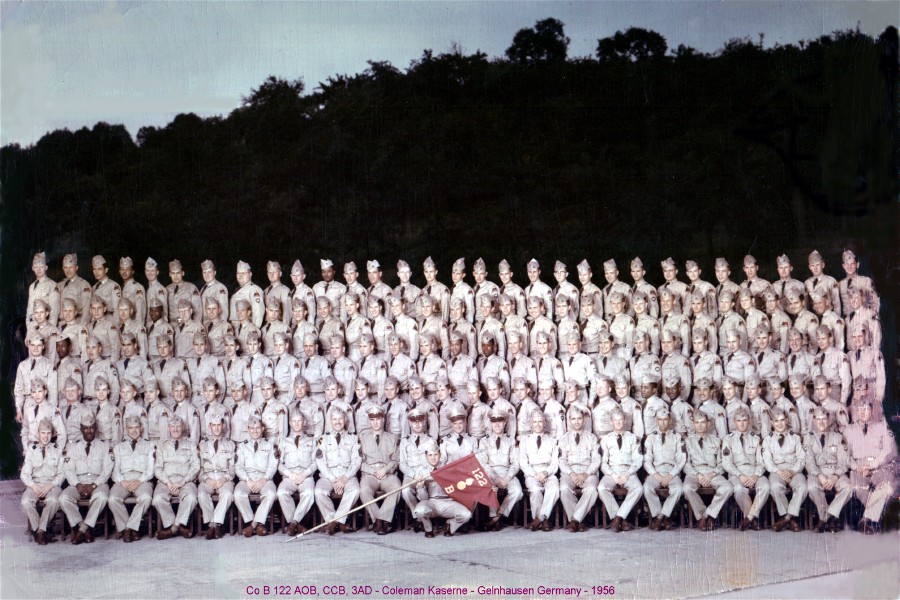 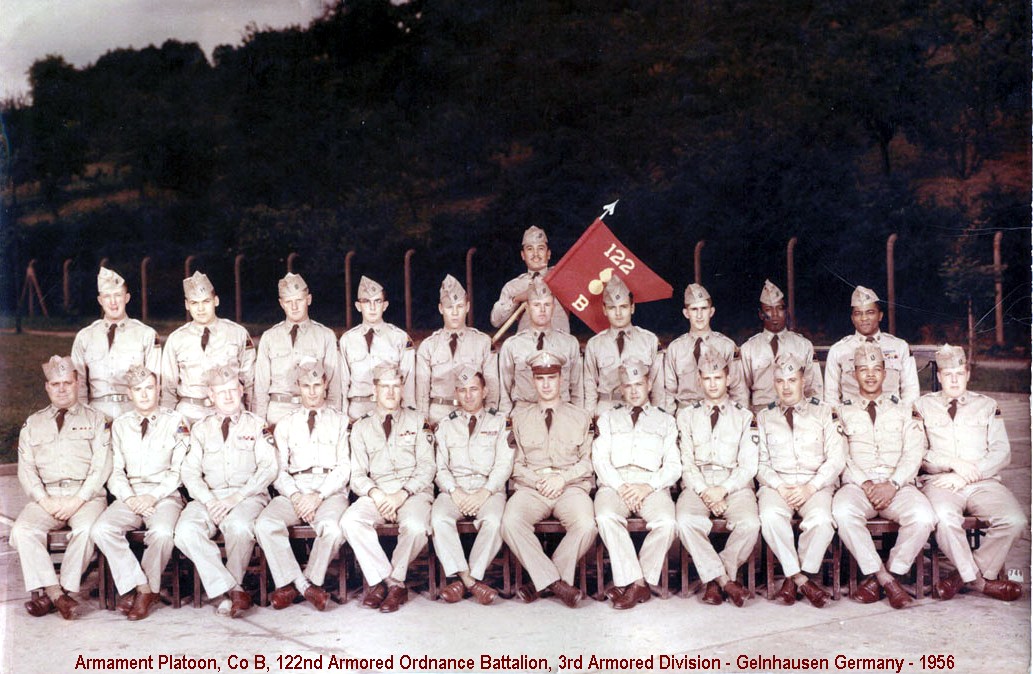 If you can magnify the top
picture, I'm sure you will be able to see those
empty sleeves we were talking about. That's me on
the upper left of this picture and top row, fifth
from the left in the company picture. We were always
formed up with tallest man on the right end of the
rank so I would have been the fifth tallest in the
company and tallest in the platoon, I reckon.
At this time, several changes were made in the conduct of the way our soldiers fit into the scheme of things locally. With the change of direction made in American diplomacy away from anti-German to anti-communism, we started having bed check every night at midnight. All personnel excepting "need to" had to be in their bunks by bed check. All personnel had to be in class A uniform or similar civilian attire when going off the Kaserne. That meant tie and all that stuff. Before, the 4th could go into town in shirt with open collar but that was all changed. 'Course, the 4th was back in the states by then. In the next picture, that's me in background, Mitchell on the right of the picture and Lugalis on the left. We're having roast duckling downtown Gelnhausen and it was very good. Mitchell and I are from Iowa and Lugalis was displaced person from Latvia, I think - one of those countries. First time I ever used a "finger bowl". As you can see, we are all still privates. 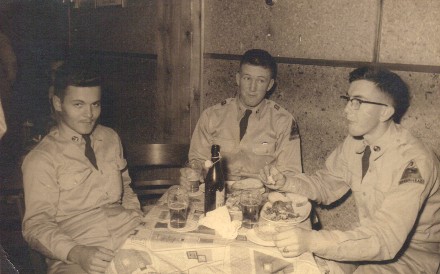 In general, it was try to set good example by USA. In general, it was try to set good example by USA.While we are on the subject ...... The civilian food we got there was very good. Our favorite was probably "Weiner Schnitzel mit kertaffels und bret un buutter" and beer. Breaded veal cutlet with potatoes and bread and butter. But they had all kinds of stuff for cash customers. And really odd ...... they had some GI, probably 4th Infantry Div, open a restaurant there in Gelnhausen and it was called "The Japanese Stubbe" and it had the Japanese decor from 4th's veteran's Japan and Korean experiences, etc. They had good food, including pizzas. Let's see if I can get this right ....... You were in Germany, could go into an American-owned establishment, set in Japanese Decor, and eat Italian Pizza! And all of it good, well done! And I got a really nice steak in the restaurant once. I went in and ask for a "New York Strip" steak and they didn't have it. So I asked what they did have and they said "beefsteak," but smothered in fried onions, etc so I ordered it. By golly, I think that was one of the best steaks I ever got anywhere. It was really good and I was afraid it'd be tough but it wasn't. Some of the guys heard about a place downtown that would set a dinner up for a group and lay it out like one of our home-cooked meals. So several of us pitched in for the deal and got the thing set up. I remember someone wanted "fried potatoes" and so did I so we made sure that was served, too. We went down to the restaurant on the appointed date and sure enough, it was all set up, looked pretty nice and was good, too. Me and my buddy got our fried potatoes, too. I don't think I ever saw them served on an army chow line. After we were there awhile, the guys got to the point they could go into a German shop and buy lunch meat and bread, etc for sandwiches. We found the German lunch meats (sausage) to be very good. I always liked their bread, too. I could damn near make a meal out of the German bread with a little butter on it. And when I was there, we used to go clear to Frankfurt, Germany to get "bock-wurst und brochen" and had to stand up to eat it when we got there. There was a stand by the Frankfort train station that had these sausages and buns and were they ever good. You stood at the counter and were served the sausage, bun and some mustard on a small plate with napkin. You took the napkin and got a hold of the sausage then dipped it into the mustard and took a bite. You ate with the bun in one hand and the napkin-wrapped sausage in the other. They were delicious (made mostly with ground veal). I guess just 2-3 years later, they put one of the stands in Coleman Kaserne so our replacements didn't have to go to Frankfurt, I reckon. We did not pull K.P. (kitchen police - heh, in the army you don't clean something, you "police" it) in Germany. There were many Germans looking for jobs so as a help to them, and ourselves, too, admittedly, we hired them to do the K.P. Each guy in the company kicked in $4 per month, I think it was, and they did the K.P. We all thought it was a good deal as the duty was disliked by all of us and the Germans were happy so it was a win-win deal. There was talk of hiring a full-time barber but that didn't work out for some reason. We did not have to stand guard either as the combat outfits did that. When we went into the field for training, etc we generally assumed most of those duties again if we had to. But they did have a deal then that whoever the MPs/guards caught going over the fence to illegally leave the kaserne was punished by having to stand guard every night between hours of 6 o'clock and 10 o'clock until THEY caught someone going over then THAT guy had to stand the guard until they caught someone else. Problem was, they were given live ammo and, right after we got there, I heard gunshots (warning shots, I'm sure) two or three times in the evening. It wasn't long and nobody would try it. Then, not long after we got there, the practice was stopped. Then we started having "alerts". Everything had to be set up for quick movement of personnel from the Kaserne into the boonies where we deployed to our designated alert areas, all in the event of a "surprise" attack. We generally got the alert in the wee hours in the morn before daylight and you'd grab all your essentials and webbing, weapons, etc and head for the trucks. 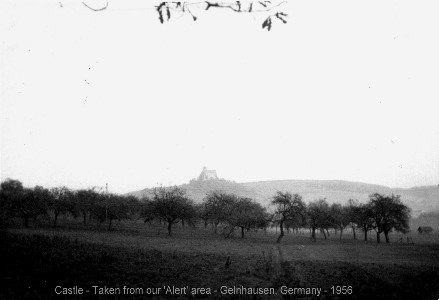 Even though we were trained to do this it is still amazing the things that can go wrong. We had several Officers and NCO s who lived off-post "on the German economy" and they had to be notified. This was done though "Telephone Trees" organized so as to make sure everybody got the word. Our very first alert put us in an area by a castle and there was an apple orchard right by the alert area (which was always in the timber somewhere) and I took this picture there on our first alert. Amazing thing about the German countryside ....... there were almost no fences. No one lived on the land as farmers do here in this country. They all lived in little villages and kept their farm animals inside the buildings that they lived in and took them out for their grazing, etc then brought them back at end of day. The animals I saw appeared to be thoroughly domesticated. They were kept in the bottom floor of their homes and the peoples' living quarters was located above. All animal waste was collected into "honey buckets" and then carried to the fields for fertilizer in what everybody called "honey tanks" which was a large wooden tank on a farm wagon drawn by oxen or horses and when we were there, often a horse and an ox yoked together pulling the wagon. Needless to say, when you met one coming down the road, he got the right-of-way with plenty of room. I saw several horses with U.S. army blankets on them under their harness, generally in cold weather. They were good wool blankets and I didn't understand why the Germans didn't use them in their bedrooms. When I saw that, then I could understand why they didn't need the army blankets. They used the feather ticks and when they obtained the blankets, it was specifically for the horse. All of this, I imagine, because of centuries of brigandage, etc against the peoples of Europe. They were all banded together in the safety provided by the small villages. I remember my shock when we arrived there at the complexions the men of the 4th Infantry had. They were all very pale, I thought. And I noticed the same with the German nationals. Very few had anything close to a tanned skin. Not knowing the weather there, it all seemed odd to me. Then after being there for awhile, I understood. Then in the summer it warmed right up and was very uncomfortable. They were saying it was one of the hottest times they had recorded. I remember TV, I think, and they were saying that one country, Hungary I think, had such hot weather that asphalt streets were actually starting to "melt" and they were telling about this woman crossing a street somewhere and she lost a shoe that got stuck in the street's surface. Anyway, they had weather to which I was unaccustomed. But it never got bitterly cold in the winter there either, as it does in my home state of Iowa. I remember one night in the late winter or early spring when I awoke and the window looked red so I got to looking at it and it would get brighter then fade a little and I thought maybe there might be a fire there somewhere so I got out of bed to get a better look out of the window and would you believe ......? The whole sky was red! Beat anything I ever saw. I watched for awhile then went back to bed. Had to be northern lights. I just didn't realize they could be seen from Germany. They weren't green, just red. 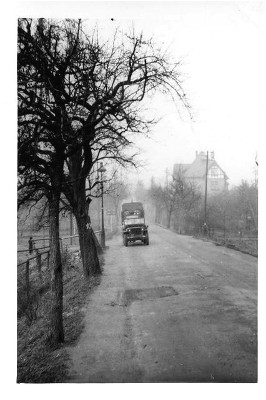 The social mores were different there
too. They still used "old world" manners, etc. Women very often walked arm in arm. And when
someone had to answer nature's call when they were out
in the open, along a road, or whatever - they discretely
did so with everyone's back turned and no one thought
anything about it. Girls rode men's bicycles, there were
no "girl's bikes" in Germany that I know of, and of
course their dress or skirt would work it's way up
towards her waist and no one thought much about it but
you let her see an American coming down the road and she
would immediately try to get the dress down. The social mores were different there
too. They still used "old world" manners, etc. Women very often walked arm in arm. And when
someone had to answer nature's call when they were out
in the open, along a road, or whatever - they discretely
did so with everyone's back turned and no one thought
anything about it. Girls rode men's bicycles, there were
no "girl's bikes" in Germany that I know of, and of
course their dress or skirt would work it's way up
towards her waist and no one thought much about it but
you let her see an American coming down the road and she
would immediately try to get the dress down.The German roads were narrow and couldn't handle heavy armored traffic and would go to pieces if it was made to carry too much. Nice roads but they were not the famous Autobahn. The roads often had fruit trees planted along the shoulders, generally apple trees. I thought it was pretty neat as each village could partake of the harvest (maintenance too, probably). The picture to the left gives some idea of most of the roads in Germany when I was there. I imagine they are much improved by now. There are the trees right by the road. The pictures just below are the
closest thing I have to showing a village.
The picture on the right does
show the out door "facilities" of the gasthaus of
this small village. Note there is one for the women,
one for the men, and one that both can use but just
for urinating. That's Pissior, Herren
and Damen ........ That's me in the
civies and Jim Dowell,
Jack Randolph (with the 'specialist' rank on his
jacket) both artillery section boys.
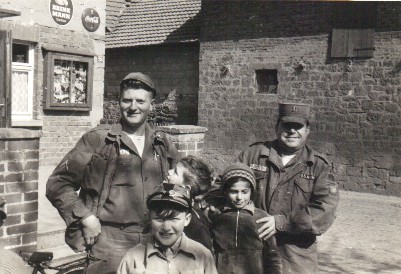 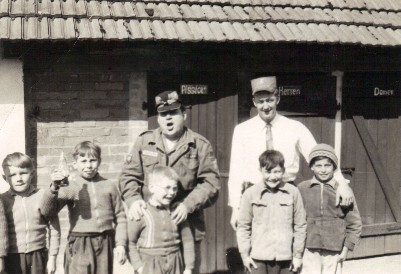 Interesting story here. We were on the road to Budingen and stopped in this gasthaus for a break and while we were there some kids came in. Well, let army boys with a little money in their pockets and some kids who generally have few defined likes or dislikes get together and it's a holiday. We bought them candy and sodas, etc and were having just a great time. And here comes the village school teacher looking for the kids. Boy, we got our butts reamed over that deal, in a foreign language, of course, so I'm not really sure what the guy said. We certainly felt pretty sheepish about it. We just never gave it a thought, didn't realize the kids should be in school but we showed'm a good time! Then came the Hungarian thing in 1956, I think. I got so teed off by the way America handled it that I got downright inhospitable. The Voice of America had kept calling for revolution behind the iron curtain and were constantly inciting the citizens of Poland, Czechoslovakia, and Hungary "to rise up and revolt" and all that B.S. then when they did, as did Poland twice, the 2nd time I was there, the U.S.A. was suddenly hard to find. Just made me sick. Then when Hungary did their thing the Russians turned their tanks loose on them. Then all the other countries of Europe had to pick up and care for all of the refugees who were trying to get out of harm's way. Once the state knows you were active, you're done and those guys had to cut and run - leave their countries. Even then the USA resisted taking them into our country. Canada and Germany wound up with the most of them and Brits and USA just stood there with their teeth the only thing in their mouths. Then, when the Germans had accepted a bunch of them and they were in a displaced person's camp not too far from us, under guard, some of the GI s where I was were trying to get down by the camps because they figured the women would be more readily available there because they were hard up! They'd trade their favors for a few cigarettes or some candy or food! I suppose it is manly to take advantage of the weak ..... I still get angry when I think of that deal. Later I even went so far as to advance the hypothesis that the communists in the US government were complicit in the Russians' actions. They incited the revolts specifically to cause the opposition leaders in those countries to reveal themselves and when they did the Russians arrested them and forced the remainder to flee the country thereby retaining their control over the citizens of the countries. Sorry, but that's the way I saw it and I was right there. The Germans were really in a panic. We had a big maneuver planned for the same time, Sabre Knot I. And when we started it, the Germans population thought it WAS in response to the Russians and like I said they got scared and started hoarding food and everything. You couldn't find butter and other basic commodities in our area. It didn't last long but I got to see enough to know how something like that can really activate the fear nodules in people. Sgt Dancy and his German wife lived off-post in a German apartment and were pretty well informed and he kept me up to date on the German views on matters American. He told me that some women had asked him what was going on and when he told them the USA was only doing an exercise we had been planning on for a year, they said, "Oh no, they've got their Rusky caps on!" We got a chuckle out of it, about the only one. The women were referring to the "pile caps" the Americans now wore in winter and had copied from the Russians. They knew what they were talking about. Kind of funny here, in the maneuver. Like I've said, when we went into the field, unless I had to support tanks on ranges, we instrument people never had much to do so we got farmed out to whoever was short of men. Well, this big maneuver was no exception. Only this time they needed "road guards" to help direct traffic. Well, they chose me and my machinist buddy Tausche as two of them - there were probably a half-dozen men in our group and this LT ran the enterprise. They would take us out to the front of the column and post us at intersections and our job was to make sure the column did not take a wrong turn. Then they would come pick us up and race to the head of the column again for another intersection. Well, I got dropped off at the edge of a town where a road branched off and it was a Sunday and local people were out strolling all over the place and pretty soon the Lt comes roaring up to me in his jeep to make sure I had the roads right then said, "what are all these people doing all over the place, run'm off!" And I told him I had tried but they didn't seem to care and I hollered at them again that there would be tanks flying down the road pretty quick and got same result. But Lt. knew just what to say and all he had to holler out was, "Panzer commen!" and those people grabbed their kids and took off like it'd be Joe Stalin coming down the road! Hell of a deal to be traumatized like that ...... Then in this one deal, the column had passed through a town so the road guards, 2-3 of us, were standing at the main intersection waiting on our ride and the German kids gathered all round us. Must've been 15 or so of them. Now, like I said, Tausche was fluent in German language and the kids were mostly jammed around him, right up against him. They were asking for chewing gum, etc. Anyway, Tausche had a M1 Carbine slung over his shoulder and the kids were picking at it and Tausche was having a hard time with the kids and pretty soon one of them stepped back, asked for gum and when Tausche procrastinated, the kid held up the "operating rod" of Tausche's Carbine and, in effect said, "No gum, I keep this!" so there we were trying to get the thing back and then I think the other kids finally made the one give it back to Tausche. How the kid got the thing out of the carbine without doing the complete dis-assembly, I don't know. We tried it and couldn't do it. Generally speaking, we liked the kids. They seemed better behaved and more polite than those back home. The first thing I got into was an inspection in summer or fall of 1956. Kind of crazy deal and temporary. I'd just turned 19 years and we had a big inspection of our company's T.O.E. equipment. I think that's Table of Organization Equipment, the equipment our company was issued. Mostly Ordnance and Engineering Equipment. The Ordnance inspectors passed us OK but the Engineers tore us apart. We'd had troubles back in Knox and they were getting even, I reckon. Well, we then had to inspect them and I got tagged for the job. I don't know how, why but I had to do the "Instruments" inspection. Anyway, my section chief, Sgt Dancy, takes me aside and tells me to find everything wrong I possibly could. I wasn't happy about it but he said to "Just do it!" So I did. I went with the ordnance team to the Engineer's Kaserne in Hanau and proceeded to do the inspection. The first company I did had a few optical instruments, not much, and I rejected probably 30% of the stuff. I went to the next company the next day and rejected some stuff but not as much as first one as they had turned in some of the defective stuff so I couldn't "gig'm." I went to the next company on 3rd day and could find hardly anything wrong nor was I able to for the rest of the "Inspection" activity. About that time I found out that as we had gone through the first company, when done they then helped the 2nd company get ready and when the 2nd company was done then the 1st and 2nd joined and helped the 3rd and so on so that when I got to the last 1-2 companies, almost everybody in the battalion was helping on their stuff, five companies in all, counting the bridge company. It was a really impressive performance by them I thought and those turkeys earned my respect and regard by doing it. They had one Hell of a unit as far as I'm concerned! They've all been my buddies since then. 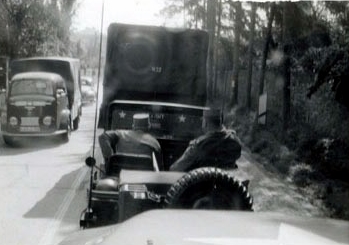 Along in here somewhere our Company Commander, Captain Miller, was promoted to rank of Major and for some reason, none of the officers we had was given promotion to take his place and another Captain in the battalion was brought in to run the company. That's how we wound up with "Wee Willy Wisdom" a huge man, nearly 6.5 ft tall and weighing close to 300 lbs. He's the big guy in the jeep just to the right ........ He came into the company as an authoritarian type person and he was not there long before the guy confessed to the whole company formation that something was wrong here somehow. He said he had been told before he came to the unit that we were a "bad" unit and needed straightened up. Then he almost sobbed and said, "But someone has their information wrong ........ I think this is one of the best units I've ever seen. You just keep going like you are and you sure won't get any flack from me. I'm proud to be part of the unit and if you need help with anything, you come see me!" And that's how we got "Wee Willy" and learned to like him. It has to be some kind of record, 2 company commanders in 3 years and both aces. There were a lot of guys who re-enlisted out of that company, way higher than average, and I believe it was because of the top officers we had in it. Good leaders just make your job, your whole situation, so much easier and better. Our section was working out of an ordnance van and we cleaned/repaired binoculars, telescopes, arty and tank gun-sights, and other fire control equipment. I was generally the one who was sent out on jobs away from the van - sometimes as far away as the training areas around Graf and Vilseck where the job generally lasted a week or two. 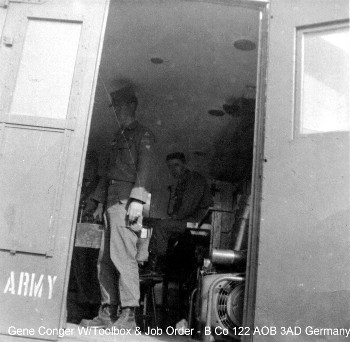 That's me standing in the van, toolbox in hand and job order in my pocket getting ready to go somewhere. I have some rank on my sleeve here so it would've been later but it is representative of what I was generally doing from the fall of 1956 until I left Germany in June 1958. Kind funny thing happened about halfway through my tour. Like I said, we split the work up - Sgt Dancy took mostly stuff on post which would've been 33rd Tank and 65th Artillery Battalions and some mortar stuff from 48th Inf. I took everything away from post excepting when Dancy would be in the field with me, then we shared. Well, one time Dancy asked me to do a "courtesy" inspection requested by the 33rd Tank Battalion for some reason, so I did. Come the designated day, I went to their shop/park area not much over 50 yards from our Ordnance Van and reported to their shop office where we agreed upon a plan for my work. I agreed to start my inspection of the tanks' fire control systems more or less in the middle of the park while the rest of them would start at their shop, then go to weapons section at end of row of tanks, then to the row of the tanks, every body working to the right. 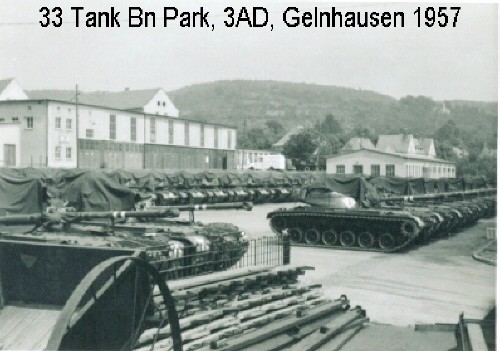 That way, we wouldn't interfere with one another. So, I
went back to the street that came up from our van and
entered the center of their park, splitting the row of
parked tanks in half, so to speak. The street is the
space just to the right in the photo. Their shop is at
the right end of the photo and right across from it the
mortar section was set up. That way, we wouldn't interfere with one another. So, I
went back to the street that came up from our van and
entered the center of their park, splitting the row of
parked tanks in half, so to speak. The street is the
space just to the right in the photo. Their shop is at
the right end of the photo and right across from it the
mortar section was set up.I got into the first tank and checked it out, everything is OK so I go to the next tank and when going down into the turret I could hear this shouting and so forth but just went ahead with my work and was no time and someone was hitting the side of the turret to get my attention and when I stuck my head out, a 33rd tanker told me to forget it, the inspection had been called off. Well, I went back to their shop office and was hardly anyone around and found my contact and asked what's going on, do we have an inspection or not? And would you believe? The guy says well everything was go and the inspection team was going to start with the mortar section and when they went over there, the Battalion C.O. went up to the 4.2 mortars and looked down the first one of the tubes, saw something and made the crew empty out the gun tube and you won't believe but the gun crew had taken a break before the inspection and when done and were pressed for time had wadded up the pastry wrappers, stuffed them into an empty milk carton (over in Germany the milk came in waxed cardboard cartons that were round and about the diameter of a 4.2 in. mortar) and shoved that into the mortar tube! The colonel saw it and that was it, he just blew up and then cancelled the inspection for the time being. And that's how I got out of the chore. The next time they did the inspection, Dancy was available. I guess that colonel had their asses sticking up for most of the next week. He should have, they had it coming ........ jeez, what a dumb thing to do! 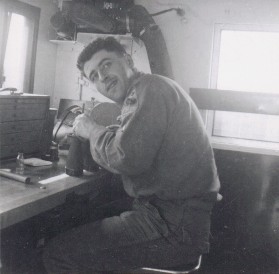 Sgt Dancy stayed pretty close to the van because he was the section chief. If I needed help all I had to do was ask, which I did every now and then. He and I were the guys who did the CCB stuff. We had a couple guys who worked in the van but were not full Instrument mechanics. They could work on binoculars and some other few things that we had taught them but that was about it. The guy to the left here was one of those people. His name is Provost and he came from New England part of USA, was a draftee, a replacement and not one of the original bunch. He did just fine on certain things. I rotated out while he was still there and I assume he would have expanded his experience somewhat before he left but I doubt he would re-enlist. You can see the binoculars he is working on there on the bench in the van. His wife was with him in Gelnhausen and they had an apartment downtown, one of those guys in the "telephone tree" - I don't recollect they had any children with them. So I really didn't mind going into the field as I enjoyed it and he and his wife would spend more time together. The only thing I didn't like about working in the field was that it was a 24/7 deal while folks back at base got 1 1/2 days off on the weekends - we didn't - worked holidays and all. The Instruments Section looked like this about the time I rotated out of Germany and back home. I probably would have re-enlisted there if they'd had a slot for a promotion but there was none. L - R: Frank Lovelace, Sect Chief Jack Dancy, myself and Roy Provost. 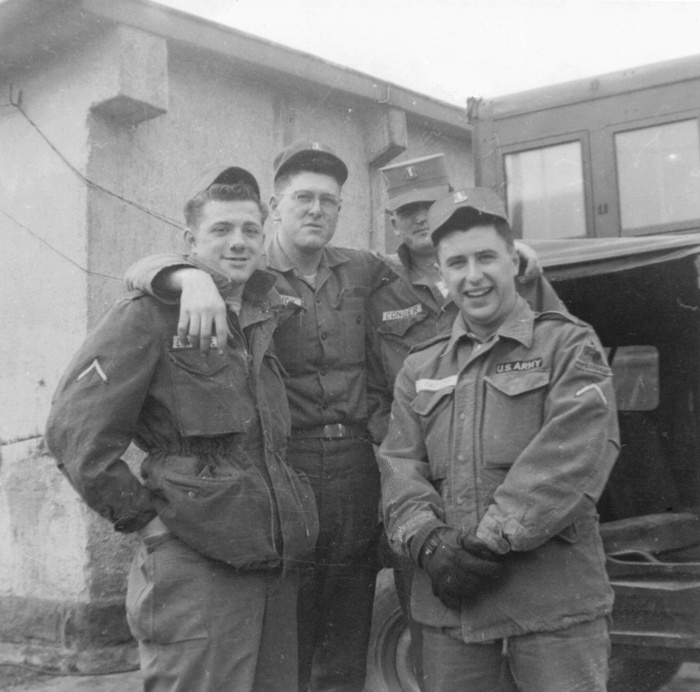 That sergeant back in Knox must've seen something in me I didn't know I had 'cause I was able to adapt real quick to the fire control systems on the M41Tank, The M48Tank, The M52 Self-Propelled Howitzer and mortars and associated equipment such as the "aiming circle" (an instrument that does the same thing a transit does excepting it is graduated in army mils rather than degrees, etc). It's used to set up or "lay" a battery of artillery guns or mortars, for firing indirect fire. 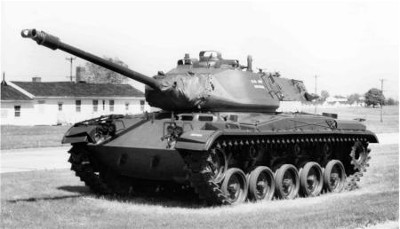
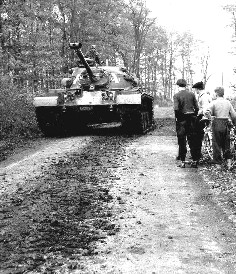
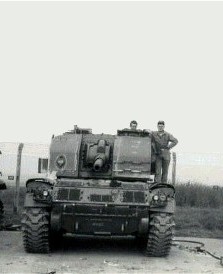
M41 Tank 76mm
M48 Tank 90mm
M52 SP Gun
105mm
I even got to work on the system for the AA Twin Forties which were in Hanau where the engineers were. I still remember the sighting mechanism's Model No ...... M38(?). They were at Fliegerhorst Kaserne, a WWII German Air Force field. They were the 57th AAA Battalion armed with M42 Twin 40s, a light tank chassis with side by side 40mm guns on it, and Quad-Fifty Half Tracks, the army's M3 armored half-track (wheels on the front and tracks on the back) and mounting 4ea 50cal. machine guns and designated M16. 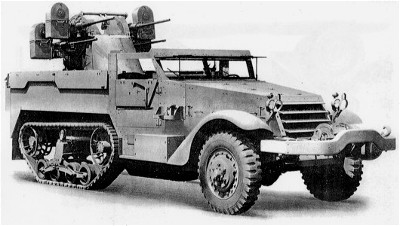
M42 Twin
40mm
M16 Quad .50 cal
I just loved it. Got to go to different Kasernes and made all the firing ranges in the training areas. I didn't always get it right, but did well enough no one ever tried to correct me. Amazing ..... just 19 years old. We're back at Coleman and along about this time we were all taken from the shop area early one afternoon and marched to our barracks where we were taken into the building but made to stand in the hallways and then they took one man at a time into his room and they went through his lockers, etc. Obviously, they were looking for something. It was in the summer and we had window open in my 3rd floor room and when it was my turn, they took me into the room and they were just finishing checking my stuff when there was a commotion outside and I could hear somebody loudly say, "There it is!" and the 2 sgts with me went to the window and when we looked out saw a sgt on the ground retrieving an object wrapped in white cloth from the hedges not too far from my window. He identified the window it came from and since only one guy was in the room .......... They had stationed sergeants around the building on the ground to watch the windows while the search was going on inside and the sgt had seen it come out the window. It was an expensive camera that someone had stolen from one of the "Wheel Section" guys just down the hall from us. The thief had grabbed it and chucked it out the window into the hedge while the sergeants checking his stuff weren't looking but he didn't know they had people on the ground watching for just some such occurrence. As soon as they retrieved the camera, the search was called off. Probably when they were about a third of the way through the company. I was really impressed by the way that whole deal was handled. I just couldn't believe how well it was organized and the professional way it was done. They got that boy's camera back, caught the asshole who stole it flat footed, court martialed his ass and had him in the stockade so fast it'd make your head spin (the only instance of high value company theft I can remember in my three year enlistment). Lordy, the army hates a thief ....... anybody who'd steal from his buddies can't amount to much. One time we had an unfortunate mis-hap in the field. I'm not sure of the exact facts but I got enough of them I can tell the story. The "Track Section" of our Automotive Platoon had a little guy in it named McClure, a pretty good little guy and he was working on a M59 P.C. which had an engine that was having problems. Now, not sure but I think there was a problem with the way the thing was running and the infantry people brought it to ordnance to look at. 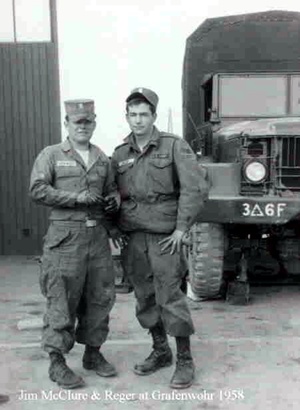 Their operator-driver was with the vehicle
and McClure started working on it. I think the engine
became "locked" during this initial check. Anyway,
hydro-static lock occurs when there is too much fluid in
the cylinder heads and the engine can't turn, it's
"locked". The procedure is to take out a
spark-plug and turn the engine over. The excess fuel is
then blown out the vacated spark-plug hole when the
engine turns. Their operator-driver was with the vehicle
and McClure started working on it. I think the engine
became "locked" during this initial check. Anyway,
hydro-static lock occurs when there is too much fluid in
the cylinder heads and the engine can't turn, it's
"locked". The procedure is to take out a
spark-plug and turn the engine over. The excess fuel is
then blown out the vacated spark-plug hole when the
engine turns. I don't know the exact procedure for this as it is described in a manual somewhere but as far as I know McClure was the only mechanic there and the infantry driver was operating the controls. The M59 P.C. had two GMC truck engines in it located in the upper rear right and left section of the vehicle (one engine for each track) and could be worked on from the top. And that is what McClure was doing, he had the protective "grate" lifted back from the engine and had removed a spark-plug(s) but for expediency, I imagine, left the plug(s) hanging in the wire's clip. He then hollered at the driver to turn the engine over and the poor guy did, BUT HE LEFT THE IGNITION ON! And when the gasoline spewed out, the plug fired, just a ball of fire came out from the engine and hit McClure directly in the face. He let out a big yell and took off running, forgetting he was on top of the vehicle about a good 6-7 ft off the ground, and fell into those big rocks that cover a tank park's driving surface. Hell of a deal, no one was to blame unless everyone was in just too big hurry to stop, think and take precautions. Fortunately, he just received superficial burns, lost his eyebrows, etc and apparently was not seriously hurt by the fall and everyone learned a valuable lesson. That's McClure to the left. We had pretty good NCOs and Officers I thought. Most of them did not have their heads stuck in their posteriors as many do. They seemed to take our jobs seriously and were generally trying to advance the efficiency of our support for CCB as a whole. 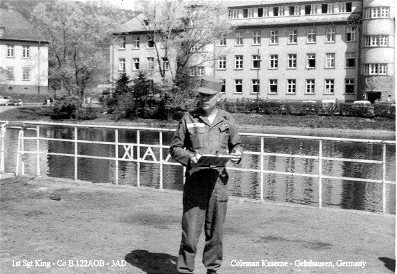 The 3rd A.D. had a policy of not having over 15% of all equipment down at any given time and we tried very hard to maintain those goals. Our Company Commander had a big board covered with plastic in his office in the orderly room and every kind of equipment we supported was listed on the board, even "Instrument Lights" which our section handled (they were the tiny lights attached to aiming stakes so you could use the stakes as a reference point in night-time firing of the big guns and mortars). The status of each type was logged every day and either I or Dancy logged the Instrument data. That is our 1st Sgt just to the right and Lt. Avey can be seen below. Both were good leaders. King was a southern boy and very sensible person. He had sustained a head wound in Korea and had a metal plate in the upper side of his head but was still a good man as you can see by the photo. 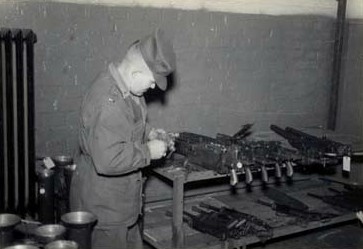 1st Lt. Avey was our
Platoon Leader and maybe the shop officer later and was
a hell of an officer - efficient, knowledgeable and a
fine person. So was our original company commander, Capt
Miller. Miller was from Sioux City, IA and had two
teenage daughters. He was promoted to major not long
after we got to Gelnhausen. We were genuinely sorry to
see him go. Avey wasn't with us more that a year after
we got to Germany. Lt. Creighton became our platoon
leader. 1st Lt. Avey was our
Platoon Leader and maybe the shop officer later and was
a hell of an officer - efficient, knowledgeable and a
fine person. So was our original company commander, Capt
Miller. Miller was from Sioux City, IA and had two
teenage daughters. He was promoted to major not long
after we got to Gelnhausen. We were genuinely sorry to
see him go. Avey wasn't with us more that a year after
we got to Germany. Lt. Creighton became our platoon
leader.The officers and NCOs can be seen in the above company pictures. Not all were really top grade but most did a good job. It is worth noting that our original complement of men had very few draftees in it. This was because of the schooling, etc they were giving to the troops in Ordnance, Medical, Communications, etc. I think they felt that by the time they got a draftee trained properly, his term of service, 2 years, would be up and the training would be for naught and the army receive no real benefit from it before he departed the army. So, they selected all the 3 year plus people they could for those support units. I think we only had about 7-8 draftees in our company when we went to Germany - the remainder being volunteers. After the start-up phase we started getting them in as replacements. As part of the program to ensure ready equipment was where it was supposed to be in the event of conflict, we started carrying a small inventory of tanks and trucks with us to use as "spare parts" so to speak (our Technical Supply Section handled all ordnance parts for the CCB) so we actually carried extra tanks and some trucks with us and when speed was required in repairing a downed vehicle, we just issued a new truck or a new tank and then fixed up the inoperable piece of equipment when we had more time or sent them on back down the chain and got replacement. The idea was to ALWAYS have good equipment where and when it was needed. 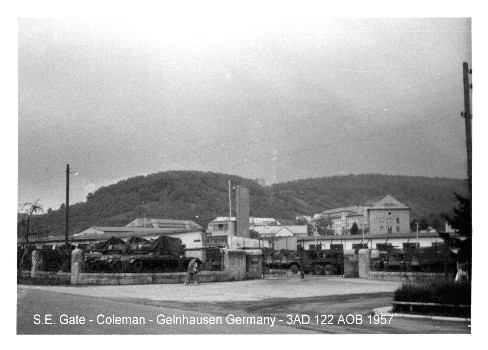 Here is a picture showing the S.E. gate to the Kaserne and it just happens to be B Company's shop area where we all worked. About all it really shows are some of those tanks and trucks. It seemed like there was an awful lot of gray, not necessarily drizzly weather but close to it - especially the first year we were there. Many of my pictures were taken during this time. The latest pictures of Coleman Kaserne show some factory or warehouse buildings down by the highway. This used to be a major motor park and the infantry outfits' Personnel Carriers filled it up. This is how it looked while I was there .......... Those are almost all M59 PCs. 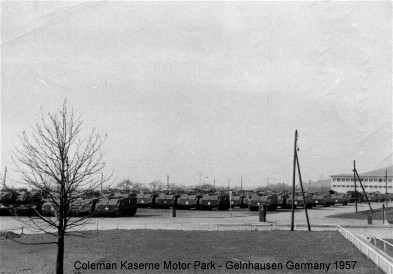 There was a Church, Gym, Enlisted Man's Club and Movie Theater all in the area where this cameraman stood for the picture. The walkway on the lower right came out of the EM Club which was in a basement under the Gym. I went to the chapel a couple of times. I went once with a buddy named Kellis. You can see him standing beside me in the company pictures. He was about the same height I was only a little stockier. When we got to the church and the service started, I realized it was not Methodist but I went right through it, a Greek Orthodox service - Kellis' religion, I guess and I felt good about it. The army kind of levels things out that way. We started 1957 off with lots more training and maneuvering and were on the go all the time. We'd had "Sabre Knot" exercise in fall of 1956, then in 1957, we got all kinds of training and "Sabre Knot 2." Had a busy time that year. We got the "Sputnik" in there somewhere, I think. I'll talk some about those events but I'm not sure of their sequence, etc. After all that was about 60 years ago. 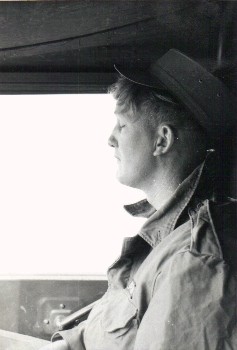 And
that's me on the right there. Jim Dowell, my good buddy
and driver of the truck took the picture as we were
driving as ordnance "contact team" in convoy with 65th
AFA as they were going to Graf for training. We were
along to provide ordnance support. Contact teams had
wheel and track mechanics, artillery and instrument
mechanics and sometimes went with the combat units when
they were on exercise of some kind. And
that's me on the right there. Jim Dowell, my good buddy
and driver of the truck took the picture as we were
driving as ordnance "contact team" in convoy with 65th
AFA as they were going to Graf for training. We were
along to provide ordnance support. Contact teams had
wheel and track mechanics, artillery and instrument
mechanics and sometimes went with the combat units when
they were on exercise of some kind.I had been in the field with another outfit and just got back to Coleman and the company told me I had to go right back out the next day for a couple weeks with the 65th Arty. Well, I went to town that eve and came back to barracks in time for bed-check and someone was in my bunk! A replacement had arrived that eve and they told him to sleep in my bunk as I was gone and they'd fix him up the next day. I just went ahead and slept on the floor of my room for that one night. Back up next morn early and away Jim and I went. So I was pretty tired and had trouble staying awake. We had a couple pit stops and we, as ordnance pulled up the rear end of the column where we could help trucks that fell out of the convoy. Interesting ...... funny thing happened here. We were crossing this high piece of ground on the highway, typical gray day, up on top of the world, when suddenly I saw this ball of fire fly up and away from one of the arty trucks up the line, oh, maybe 4-5 trucks. I was about half asleep. The ammo trucks were always at the rear of the column and I thought one of them had caught on fire and was exploding. About that time, another ball of fire shot up in the air and I started hollering at Dowell to stop the truck we were in. Well, the arty trucks from the culprit on back started pulling over to the side of the narrow road we were on and when we got stopped, I jumped out and threw myself in the ditch by our truck. Dowell is standing on the side of the ditch laughing and there were no more balls of fire. When we checked with the arty guys they told us that the driver of the truck had forgot to release his emergency brake after the last pit stop and it had got too hot and flew apart, the projectiles I saw were superheated asbestos flying through the air! The brake was located just under the area between the truck's cab and the bed on it's rear and the stuff got out through that opening. 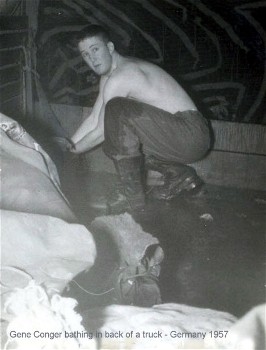 Jim
got a good laugh out of it all but getting caught
unaware, it scared Hell out of me. I sure didn't want to
be in a bunch of exploding ammo trucks. Jim
got a good laugh out of it all but getting caught
unaware, it scared Hell out of me. I sure didn't want to
be in a bunch of exploding ammo trucks. While we are on this subject, we had another little deal with the same outfit although they were not to blame. When we got to the maneuver area with the 65th, we ate in their messhall, etc. Well, the mess-halls were cheap, single level, cinder-block buildings and had the German style windows in them that open in and out. It was summertime and the weather was warm so they had the windows partly opened inward while we were eating. I remember they had spaghetti and generally, the Army's stuff wasn't too bad so we had just got our meal from the chow-line and had set down to eat and WHAM, WHAM-WHAM, 3 shells about 155mm hit on a little knob in a open field there by the messhall. I swear those windows drifted in some more when the shells hit, whether from concussion or tremors I don't know. Everyone ran outside the building and were all gawking around but I stayed right there thinking it would do no good to run - if one hit us in the messhall then it'd just have to hit us so I went outside to look then came right back in and made sure I got my spaghetti. One guy didn't come back in so I got most of his too. No more shells hit. We only counted 3, not a full battery which is 4. It had to be a screw up of some kind but nobody got hurt, nothing got tore up, just some sod but we never found out what happened. The 65th Arty had 105mm guns, not big enough for what I saw. Kind of funny though ..... someone had got the wrong hill BUT them arty guys sure hit that hill! (It had to be error by fire control people as all three rounds hit the hill - had it been individual gunner error, only one shell would have landed there). Heh, speaking of 155's ...... One time on the tank range, this battery of 155mm S.P. guns come rolling in and they are going to do a direct fire exercise at some old junk vehicles the army had scattered down range, the first "Table of Fire" on the range. Well, they wasted no time and got right to it shelling the Hell out of things. One of our guys, a West Virginian artillery mechanic named Jimmy Vannetter came over, folded his hands behind him, struck a MacArthurite pose and above the din of the firing shouted, "Jesus Christ! If Columbus'd had them guns, he'd never had'ta cross the Delaware!!" and I just doubled over laughing, so did Jack Randolph and Dowell. Vannetter was a really likeable person and I always got a kick out of the guy. I never saw him be mean to anybody. And somewhere along about this time, I think the night before I went with the arty outfit, I hurt my ribs. Well, I just got on the truck next morning and rode the sucker to Grafenwohr and hurt most of the way up there. I believe it was the time when I thought the arty truck was blowing up. Anyway, when we got there, next morning I went on sick call to get the ribs checked out. There was one doctor in this cinder-block building and he was working in a canvas-curtained enclosure in one corner and there were chairs against the wall by the enclosure for us to set on and I was working my way down a short line that had maybe a half-dozen guys in it and I had just got into the thing to see the doctor and had just taken my shirt off and there was a big commotion at the main door and the medical clerk came charging in and told the doctor there was an emergency. The doctor excused me out so I grabbed my shirt, and holding my pants up walked out of the thing while they were bringing in this guy, a LT. who had some blood on his face and trousers and two guys were packing him one under each arm, actually more like dragging him into the enclosure. He was trying to walk almost but couldn't. I thought, what the Hell, I'm not really hurt, I don't think. So just leave ...... and I did but after I got the dope on the LT. It appeared the Lt was either a range officer or was just on a range test firing some fifty cal. machine guns and they were firing them from the mounts on a M59 P.C. and a gun jammed with a round only half-loaded so they kind of waited until it had cooled then Lt. tried clearing the weapon but he got in a hurry and was actually hitting the gun with whatever he could get ahold of and the thing went off with the bolt about 1/3 way open! The round exploded and blew several small pieces of brass into his face and the main part of the round, the rear of the cartridge went through one of his legs and lodged in the other. He was pretty well tore up actually, but apparently nothing in the trunk of his body. I guess he made it OK, I never heard any more about it. I was in pain for a few days but I got over it. Like I said, there are more ways to get hurt in the Army ........ I kept up the Contact Team work, kind of enjoyed it, really. Just a young guy and got to run around over Germany and was good enough mechanic I was generally appreciated. Living conditions were not always good as you can see above but what the heck, you can't have everything. I said something about noise, right? When we were firing light machine guns? Well, I spent a lot of time on the tank ranges and those tanks make a lot of noise, too. It's a different kind, of course and it makes a difference where you stand in relationship to the gun muzzle's position, etc. Some muzzles had blast deflectors and some not so there were lots of things you had to be aware of when you were in close proximity to a gun's blast. One of the funniest things I saw was this tanker 2nd Lt. who was standing there talking to me and Randolph while the tanks were firing and he was trying to time his words between the blasts and got positioned in the wrong place and about the time this gun was ready to go off, he quit talking, opened his mouth (to reduce blast effect on his eardrums) and when it let go he had his mouth wide open but was standing in the wrong place and got a mouth-full of grass bits, pieces, etc. and wound up coughing and spitting and Randolph and I never did find out what he was trying to say and anyway, we were having a hard time decently suppressing our laughter. We went on our way, knowing the young fellow would learn in his due time. Now those were 90mm Tank Guns which had the blast deflector designed kind of cross-ways on the muzzle. The time we were watching the 155mm SP Guns fire they had a different deflector (if any) and the sound was more like a loud "crack" than the tanks which made a loud "whump," a deeper, more bass sound, seemed to me anyway. Seems to me like the artillery had a "bore evacuator" on them which helped the hot gas/debris to exit the gun tube/turret when it was fired (also helped prevent the hot gas from exploding powder charges being loaded). One instance of the firing on the ranges was really interesting. They (83rd Recon) were firing their 76mm guns on the Light M41 Tanks and quickly found out many of the guns were wore plum out, just burned out for some reason. When they were firing them they were a sight to see. I had to see it or never would have believed it but the shells coming out of those guns did every gyro-move they could make. They came out of the guns like a corkscrew, they tumbled, making a whoosh, whoosh, whoosh sound. They'd go downrange crooked/crossways, and every variation of them, you name it. Particles of the shell or blast deflector would fly off, apparently when the shell somehow struck the deflector/suppressor?! That was when we (ordnance and 83rd Recon Maint.) started changing out gun tubes! We sorted out the worst tanks and used them on "Firing Table Five" (firing at bunkers, etc.) where training accuracy was not as important, I guess you'd say. We then replaced the worn-out gun tubes working out of that "queue". But I never saw anything happen excepting the gymnastics. I don't know how everyone stayed unhurt from firing those guns. I spent a lot of time on the tank ranges there at Graf and Vilseck. 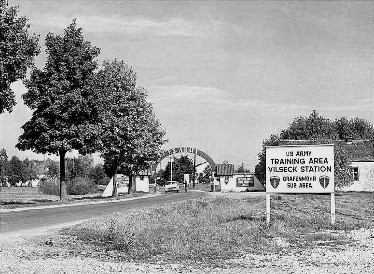 And, of course, we had to do our own
unit's training and exercising. And, of course, we had to do our own
unit's training and exercising. I remember one exercise we were doing and it was nothing more than driving around in the maneuver areas. Honest ..... I was told the exercise was to try us as to our limits and that's what they did. We were on the road for about 34-36 hours steady travel, just round and round the place. In that time, we were "strafed" by planes, "ambushed" by the cavalry, had roads "mined" - the whole bit. It's the only time in the army I got hurt and was the darnedest thing you ever saw. I was riding in the back of a 6X truck with the seats down for personnel but if I remember right, there were only a couple of us in the back of the truck. We had full combat gear on and the company decided to hang our entrenching tools from the web belt at the "small" of our backs. The canteen was on our hip and the "tool" on our back at the waist. Well, when we were going down the road and we came under air attack and the convoy halted so the men could cut for the brush along side the road. All fine and dandy excepting when the truck came under the "attack" I was sitting at the end of the seat right by the tailgate which was up, of course. The minute the truck stopped and even a little before, I whirled around, threw my legs over the upraised tailgate which was about even with the seat and jumped off the truck. The handle of the trench tool got between the end of the seat and the tailgate and stuck there while I was going through the air. When I hit the end of the slack it broke the handle and I thought I'd really screwed up my back. It really hurt and was sore for a long time. But I finished up the crazy deal and I never did go to sick call. Lots of ways to get hurt in the army. 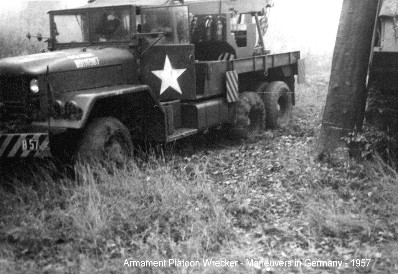 We were on some kind of alert or maneuver and when we got to this small German town in some hills and the town was in a valley, I guess you'd call it - we had to go downhill to get into the town and the road made a right turn right in the middle of the place. We were sitting on the slope downward and could see the turn in the road and there was a gasthaus there on the far side of the street. We're just sitting there in the truck and the driver, Dowell says, "What the ...... and grabs the binoculars and says look at that, right there at the turn in the road!" I look down there and a tank is sitting in the road and is turning his turret and gun towards the 2nd floor of the building. I didn't have any binoculars or anything but could see the muzzle of the gun line up with a window and saw some people appear in the window and Dowell says they were trying to put what looked like beer bottles into the gun's muzzle. Obviously, they were trying to get some beer by dropping the bottles into the gun's muzzle and had someone at the gun's opened breach inside the turret to catch them when they slid down the tube! We don't know for sure whether they got any or not. I had my doubts as the 90mm gun may not have been big enough to accommodate a German beer bottle. We sat there for a bit and the column started moving again, didn't go far and stopped and we finally got around the turn then got outside town and we then saw what the problem was. Our outfit had left the highway and was trying to get up this hill into the timber and having a terrible time of it. By the time Dowell and I got there, the large part of the hill's side had been churned into a big patch of mud. It hadn't rained or anything but the ground was like a sponge in that forest. When we finally worked our way up to the turn off from the highway and got up to the base of the hill, we could see what was taking so long. We were the last trucks in our unit and when we watched the vehicles in front of us we were wondering if we would be able to get into the area at all. By that time it was all heavy mud and they would fight a couple trucks up the widened lane then run a tank up and down the road and flatten it out, then take another 2-3 trucks up the hill and so forth. When it finally was me and Jim's turn, I debarked the truck, they hooked a cable to it and started up the hill with it and I was walking off to the side. It wasn't long and I swear he was pushing mud with his bumper like a bulldozer would do. They stopped him, unhooked whatever it was that was hooked up and hooked the wrecker's wench to him and they finally got him up the hill. All the activity tore up a bunch of small trees, saplings, and a portion of the side of the hill adjacent to the lane. Now, I said he was pushing mud with his bumper ....... Do you know how high those 6x6 bumpers are off the ground? They must be three feet maybe a little more. That should give you some idea of the capabilities of the army's wheeled vehicles. Between Jim's own truck and the wrecker, the truck could make it's way through at least 2-3 foot of solid mud - no water - just mud (and uphill)! We went to our park spot and stayed there. Severt almost got stuck just parking the wrecker and then didn't get it where it was supposed to go. The wrecker was used to lift guns, engines, etc in and out of vehicles. He's got his chains on in the above picture, on the 2 forward axles. And we had an unfortunate instance where some tankers didn't set up tents but draped their 'shelter halves" over the gun tubes on the deck of their tank thinking they would run their "little joe" starter for heat that night. I'm not sure what happened but they got carbon monoxide poisoning and one guy died. Dowell and I set our tent up, as did everyone else, and we were very comfortable. So we got through that one and then went to Wildflicken, Germany for some training. Like I said, the tankers trained and we just went along and provided support. I got into a situation here that I like to tell civilians when they are complaining about time off from their jobs. Our company started the policy they would give you the day off on your birthday. So, everything is going along fine and we are at Wildflicken and my birthday rolls around. We had some work to do because of the tanks but were pretty well caught up at the time so I asked for the day off and Sgt Dancy declined and I asked again about 11:00 AM and he still refused and finally said he'd check at noon meal and if company said OK, I could have it. I went to noon meal and at noon work call formation asked him what happened and he said he didn't get an answer and to go to work so I did. We got down to shop and it's 1:30 PM or so and I hit him up again (the day was almost gone and I was getting ticked by now) and he finally said to go ahead, I could have the rest of the day off. When I am telling this story, I then ask the listener(s), do you know when my birthday is? They of course say no and I tell them, "It's the 4th of July. You see, those army guys don't get off every time they turn around. When they are in the field, it's all business all the time!" To this day, my family criticizes me for my lassitude come holiday time. One time, I got a little rest at Gelnhausen because Dancy sent someone else from our section up to Graf on a contact team. They weren't there but a couple days and Dancy came to me and said they had trouble with some tank gun-sights and I'd have to go see if I could take care of it. So I asked what the problem was and he described to me the best he could, with the info he had, what the deal was. He said they needed some parts, too, and gave me a list. I told him "that based on what he was saying this doesn't make any sense, it can't be that way." He admitted I was probably right but said, "They need it bad and there will be a helicopter leaving from CCB Hdqrs building tomorrow morning and you have to be on it with the parts." Soooo, come next morn I got on the thing, about halfway scared of it, and went to Graf. Got there and it was like I said and I got things straightened out that first day - without the parts by the way. That helicopter was the noisiest thing - one of the older pre-turbine styles. I felt kind of like a big shot, getting to ride that thing. Back in those days not just everybody rode in one. As a matter of fact, after the helicopter got me up there and I got a couple tanks' gun sights fixed, the artillery mechanics needed some help changing out the 76mm gun tubes on a bunch of M41 Tanks. So I stayed there and helped them the best I could. Boy, if that wasn't some kind of deal. I'm not sure why the gun tubes were changed out at Grafenwohr instead of back at our base shops. It must have been some kind of "have to do right now" deal. Our company was at Coleman Kaserne and only a contact team was there at "the shoot" but, anyway, I got drafted, sort of for the duration of the job. When I went up there, I took only the repair parts and a handbag with me that contained my shaving kit and some underwear and socks and one extra set of fatigues and wound up working there for almost 2 weeks. Well, we started changing the burned out gun tubes and we did it in a small cinder block building that had a large garage-like door in it. There was no overhead cranes or anything like that and we used our 5-ton wrecker to lift the guns in/out of the tanks. If I remember right, the building was so small and with the tank inside, we couldn't get the wrecker all the way into the building but we were getting by OK. We pretty much stayed right there in the building and kept working all the time we could. I just cannot remember who we were billeted with, probably the 83rd or another Ordnance Co in our battalion but then someone decided we could save time by just moving us into the building right by the tanks that we were working on. So, next thing I know our cots are located inside by the wall just a few feet from tank area and our meals were brought to us and we generally ate on the run so to speak. Can you imagine someone working a wrench with one hand and eating a piece of chicken with the other? Well, that is what we were doing! You should have seen Jack Randolph, he always worked when he ate. Jack didn't look like much but he was one heck of an artillery mechanic. After maybe 3 days of this, we started feeling drowse and light-headed and realized much of the exhaust from the 5-ton wrecker was being captured in the building and we suffered from the effects of carbon monoxide so we moved back out of the building and started doing more work in the open air outside and started feeling better. But that was probably the longest period of just plain work I was ever involved in. We had no regular laundry service so I was stuck with the clothes I came with and couldn't change. I just rotated the 2 sets of fatigues I had and when the clothes I had on got greasier than the other set in the bag, I got the least greasy ones out and put them on! When I got back to Coleman I sent the fatigues through Quartermaster Laundry twice, never did get all the grease and recoil oil out of them and finally threw them away and bought new ones. Now if the Quartermaster service could not get them clean, buddy they were dirty! They got through the "shoot" finally and I have no idea how many tubes were changed out (they had done some before I got involved). 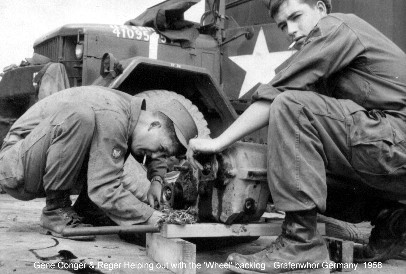 If the action was slow on the ranges, I sometimes helped out the other mechanics. Generally it would be the artillery section but if they needed help bad, I'd pitch in with wheel/track platoon as well. Here I and my partner, Reger, are cleaning up a "transfer case" just removed from a 3/4 ton truck by the mechanics. We'd prep it for crating and return shipment to 4th or 5th echelon shop, generally Mainz, Germany. The fire control equipment on-board the M48 tank just fascinated me. The Tank Commander had the "Range Finder" and gunner sat on the right side of the turret with the gun to his left. There was a "Gunner's Periscope" right by the Gunner's head, a "Direct-Fire Telescope" attached to the gun on his left, and in 1956, believe it or not, a "Ballistic Computer" on his right and an "Azimuth Indicator" that was attached to the turret so that as the turret was rotated the indicator, which was geared to the turret ring, could read the turret's azimuth movement in mils. The "computer" was mechanical, a selector handle working off cams and with servo-motors connected to the gun control system. It was not like a desktop we have today but it did it's job of providing corrections to elevation automatically to compensate for the differing weights of shells. The beauty of the system was the optical range finder which the Tank Commander operated. He chose the target, called for specific ammunition type and then ranged on the target. Now different ammunition has different weights which will affect the flight of the shell. That was the ballistic computer's job. When the commander had a target, he called out ammo type and the gunner put it into the computer, any necessary adjustments in elevation of the gun to compensate for a heavy or a light shell was made automatically. 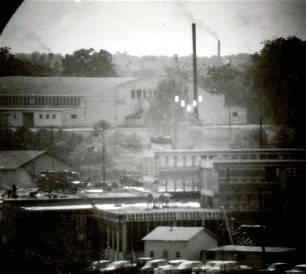 The range finder was operated by the Tank Commander and as he
was ranging, super-elevation (for distance) was
automatically fed into the gun's operating system
through use of servo motors, etc. You could see the gun
tube move up and down while he was "ranging." When the
ranging was done the gun was ready to be fired by the
gunner. The range finder was operated by the Tank Commander and as he
was ranging, super-elevation (for distance) was
automatically fed into the gun's operating system
through use of servo motors, etc. You could see the gun
tube move up and down while he was "ranging." When the
ranging was done the gun was ready to be fired by the
gunner.This ranging system worked on the principle of triangulation. The range finder stretched across the interior of the turret right at the top. It protruded through the turret walls on either side so you could look forward. Inside the left end of the range finder was a 90-degree prism and the distance between the prism surface and an adjustable mirror on the right end was a known 72 inches (can't remember for sure the exact length) so having a known base and one angle, all you needed was the second angle and you have triangulated the distance to the target. The adjustable mirror on the right supplied the second angle when the tank commander rotated it using the ranging knob of the range finder. As the Tank Commander ranges on the target by turning the knob, the mirror rotates and a "flight of geese" (a reticule of 5 bars of light super-imposed on the field of view) moves in and out on the field of view and when he positions the "geese" directly over the target, the second angle becomes known. He merely positions the "geese" directly over the target, bingo ..... he has the range and the super-elevation servos has already adjusted the gun. See'm above. The gunner generally fired the gun but the tank commander could fire the gun also and he could "override" the gunner's controls. The system was supposed to yield 85% first-round direct hits at 1500 yards with the average gunner. That is, hit a vehicle at about a mile's distance on the first try. I have no doubt of the claim's accuracy. The 3rd A.D. tankers got so good as a matter of fact, they could hit the 2x4 frame on moving targets. I saw it with my own eyes. I was on the range in Grafenwohr where the 33rd Tank Bn's 90mm M48s were firing and they were on the "transition" part where a little train runs on a track in a trench going out maybe 200 yards and then cutting across the tankers' front and they had 2 huge poles with red banners at right and left side of the range and the tankers could only fire when the targets were between the poles. So the train would go across the target area with 4-5 large, plain, cheese-cloth targets with 2x4 frames and when it had crossed then go on out a little further on the right side and then cross over to the left then out further and back across to the right. It seems to me that the targets would cross the fire lane at least 3 times so the max was probably 4-6 hundred yards. What the tankers started doing was to see if they could drop the targets before they got out past 2nd leg. And they did. They knocked the 2x4s down BUT they got wound up in the train and caused it to jump the track and they had to have a cease fire on the range and go out and get the train back on the track, bring it in and set new targets and go again. The tankers shot the thing up again and the "range officer" was raising Hell so when they got it going the next time, the guys did it right, just putting holes in the cheesecloth and not hitting the frames. Now that was at fairly close range so the range finder wouldn't play that large part in the system (I think the lowest yardage on it's scale was 500 yrds). I'm glad those boys weren't shooting at me, that's all I can say. 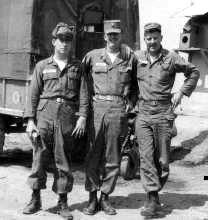 And I'm sure they have
much better stuff these days. And I'm sure they have
much better stuff these days.There's the ordnance trio to the right ..... It's Reger (went in army at 17 years and not much older here), a replacement, and me in the center and good buddy Jim Dowell, artillery mechanic, on the right. Now, incidentally, Jim's job was supposed to be "driver" but he did more mechanical work than most of the other guys in the artillery section. He was a good one, too, intuitive, inventive and a good troubleshooter which a good mechanic must be. He drove the truck but when we got there, he hit the ground with a wrench in his hand and he got it fixed. We were lucky to have him on our contact team (we had 3 teams in our armament platoon for all of CCB). When the M48s were firing, some outfit brought me an "Aiming Circle" to repair. I was on the tank firing range and set the instrument up on it's tripod and the reticule in it's telescope had turned. It was just a cross-hair and had gone out of perpendicular. An aiming circle is like a transit and is used in artillery fire control work to set up a battery of artillery guns. Only it is not graduated in degrees, minutes, seconds, etc but in French Mils, 6400 mils in a circle. I had a small tool box with me but for some reason, I did not have my plumb-line in it. In all the years of fire control work, I never did use the thing and here I am, have to have it. So I started looking for a string to maybe improvise one. I looked all over and no string. You know how the army is, they won't leave a cigarette butt laying around even. So, when I get to the mess hall that evening, I ask the cooks if they have string and someone came up with a piece that was long enough. So, when we went back on the range the next morning, I take the string and start looking for something to use for a weight, something that would not make the string hang cock-eyed, and I finally cobbled something together that looked like it would work OK. I set the "Aiming Circle" up on it's tripod and removed some of the cover on the telescope and I'm ready to try adjust the thing. I take my precious homemade plumb-bob/line to this M48 tank setting there and hang the plumb line from the gun's muzzle and go back to the aiming circle and peer through the telescope and look for the line and can't find it. I know damn well it is there somewhere and the wind was not blowing so I keep looking and traverse the telescope slightly and no string line. So, I raise my head up finally to see what is going on and the tank turret is revolving, going 'round and 'round, and here comes the gun muzzle in my direction and the precious plumb-bob sticking out from the centrifugal force and finally the turret stops and Jack Randolph's head pops up out of the hatch and I started hollering at him and he was in the tank working on the turret motor and was just checking it out, of course, by rotating it. He was done so I got everything lined back up and got the reticule back into it's proper position. I had to laugh. When Jack came up out of the turret it was ..... "Who, ME?" Just one of those crazy moments you remember when you are retired and just setting around on your front porch. Along in here somewhere, we were driving our 3/4 ton truck going to a range somewhere by Graf or Vilseck and the pavement paralleled a rocked "tank road" and we met a tank column coming down it and then our pavement turned sharply to the left and crossed onto the other side their road. We were sitting there waiting for the column to pass and the dust was really bad. Those poor tankers had the tank commanders standing in their turrets (probably to better see where they were going) and they were completely covered with dirt, goggles and all. Beat anything I ever saw, I'd never seen dust so bad. Their column slowed right in front of us and a tanker applied his brakes right in front of us not 15-20 feet away and when he did, the tank rocked and the T.C. kind of fell forward causing him to move his upper body and the dust/dirt just cracked, broke loose and fell from him in chunks. The skin was black, he was a black soldier! It then occurred to me you couldn't tell the black guys from the white ones, they all were alike down the whole column! Lord only knows how the poor guys breathed. That was one time I felt for the tankers .......... Along in here somewhere the Russians put up their Sputnik satellite. Boy, they had everybody talking. It was quite a deal - the first man-made object to be in orbit. All the bars downtown immediately came up with Sputnik drinks, some of them down-right mean. About this time, we received some "new" mounts for our .50 cal machine guns and had to fire the guns on them for familiarity training. They called them "anti-aircraft mounts" and we were supposed to be able to hit aircraft while firing it. It was a square deal made of some tubular steel and so forth. I only saw them that one time and didn't like them - nobody did. They took us out to this one "range" there in Grafenwohr which looked like a road across a marsh, the road was elevated above it so that when we were doing the firing, we were close range, firing slightly down into the swampy impact area. Well, it was one of those cold, gray days, threatening rain when we started and sure enough, it started to mist and drizzle, not really rain so we just put on our ponchos and kept firing, the wind blowing into our faces. The impact area for the fire was right in front of us, just a matter of a few yards maybe 20-25 yards or so and when the bullets were hitting the ground, geysers of a fine mist with some grassy debris were erupting and maybe going 20-30 ft. into the air. Pretty soon I noticed this stuff accumulating on my buddies' ponchos so checked mine and there was these very small bits of mud and pieces of grass sticking to the front of my poncho. The machine guns was chopping the stuff up and flinging it into the air and the light wind was blowing it right back on us. I remember looking at it and thinking, "My God, what if there were people there in the impact area, would pieces of them be stuck on there, too?" I have to admit I got some really odd feelings about it and fortunately the drizzle turned to rain which washed everything off and we finally quit and got out of there. 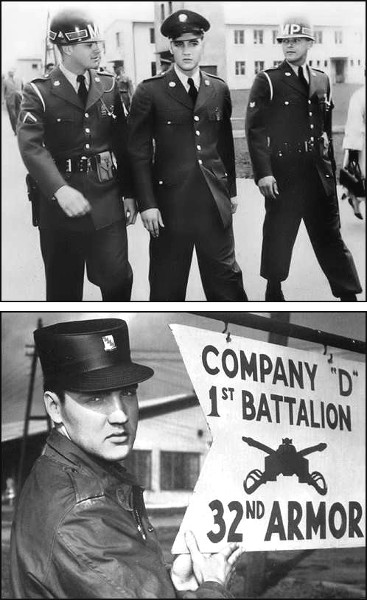 Along
in here somewhere, the 3rd A.D. got a big surprise
....... A BIG SURPRISE! Along
in here somewhere, the 3rd A.D. got a big surprise
....... A BIG SURPRISE!Elvis! Yep, he got drafted and went right into the army and wound up over in Germany in our outfit. Quite a deal. He went to Frieburg, Germany to CCA, I think it was. They were north of us a little way and just a little west. I had never cared much for Presley or his music, didn't like him actually. Well, when he went into the army and when we saw he didn't get blatant preferential treatment in "special services" but did his full service in a "line outfit," we all changed our minds and accepted him. Actually, we were kind of proud of him. He gave up an awful lot to serve those 2 years in a tank outfit with those "beasts". 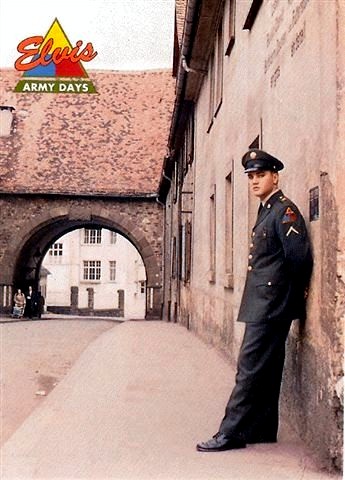 He never served as an army "poster boy" though I'm sure the army found ways to make themselves look good because he was there. He didn't do USO shows or any of that stuff that all the other Hollywood turds did. Just soldiered. We had other celebrities, ball players come to mind; Feller and Williams fully served and Jimmy Stewart flew during the entire war but by far, most didn't really serve. Elvis did, albeit in peacetime, Ali didn't. Because of this, few G.I.s, me included actually saw Elvis over there. He was too busy soldiering. I am even grateful for him adopting and accepting our way of life there for a couple years. If he could do it, so could we. Here are a couple more pictures. Just an ordinary Joe getting his mail and freezing his ass off with everybody else ....... and I really like and respect him but for giving up so much and serving, not the music. 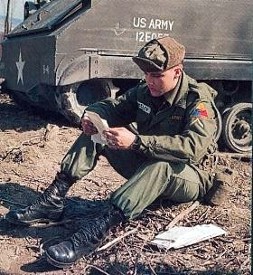
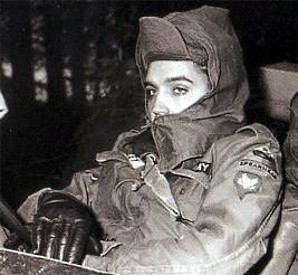 Then we start getting into 1958
and our enlistments are winding down. We had already
got our first bunch of replacements in 1957 and they
were assimilated already.
Then the darnedest thing happened. I don't know, probably Feb 1958 Sgt Dancey came to me and said we had to send a guy to Nellingen, Germany down by Stuttgart to learn about the M48 Tank's fire control system and I started going over our guys' names and Dancy said "No, you are the one who is going" and I said he had to be kidding - that me and him probably knew more about the system than anybody over there! He just laughed and said we've got to send somebody, even if we send someone else they'll be gone in no time anyway, so why not you? You can go down there and get some time off by Stuttgart and have a good time during Fasching. He says, what the heck, you've earned it and you're going! Well, I sure did go down there and like Dancy said, it was a week off, really (and got snowed in for another 4-5 days). We got down there and they had one sgt (but were probably more) that I remember in the "school" and he showed us how to change out the major assemblies which is what 3rd echelon mechanics did in those days (and we had been doing since we got there 2 years before). The actual repair was done at 4-5th echelon shops. Late in the week we got to the range finder and it had a problem where a lock ring came lose allowing the ranging gears to get out of sync making the range finder inoperable and the problem was becoming endemic to the gun system there in Germany. We'd had a couple go bad on us at Gelnhausen and when the 2nd one came in the tankers were in a hurry for it so Dancy and I took the range knob mechanism out of it, found the problem and fixed it, got it back into the tank so they could use it right then. The devise could be changed out later when part was available and the tank could be taken out of service. The sgt at the school showed the class how to replace the tank's range finder and it was setting on the floor of the shop and I told him I could fix it for him but he said "Oh no, we aren't supposed to touch that stuff." The larger, major instruments were tightly sealed and filled with a "dry nitrogen" gas which prevented the lenses fogging over when temperatures fluctuated, etc (inside the heated turret and outside the tank) and the lower ordnance echelons were not equipped to do this. We had worked on the one because it was warm weather and they needed it right then and then it could be changed out a month or two later. Well, it was Friday, last day and the sgt says just go ahead and put it back in the tank (like it was a replacement new one), I've got to go ........ somewhere, and took off, left us there with the thing. So, soon as he was gone ....... yep, I took that little component out of the range finder, got the gears back in correct sync, locked the cellular ring in place and we put'r back in the tank for the next class, just for orneriness. I never heard what happened when the next class couldn't find that problem in the thing! I just went on about my business. Not too long before I rotated out, they had a NATO Parade down at Hanau and boy it was a big one. I don't know why they called it a NATO parade because the 3rd Armored Division was the only outfit in it. Perhaps because the NATO Commander Norstad was there and was the ranking personage. Here are some pictures of the event which we all thought was impressive ......... 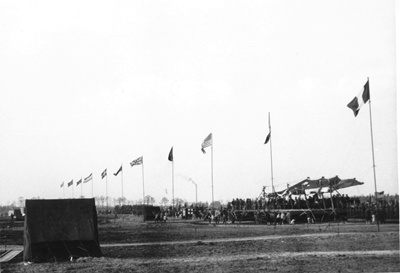
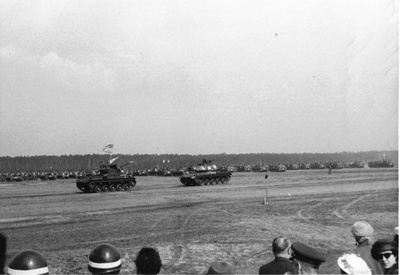
NATO country's
flags
3rd Armored Division Colors
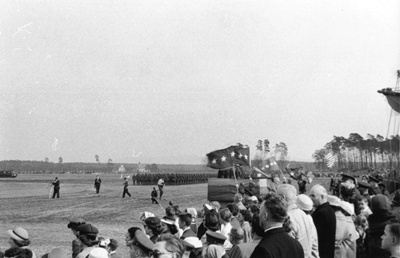
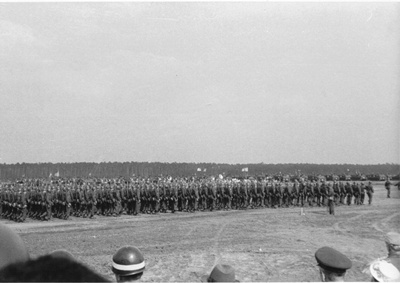
A Four-Star Flag
Infantry Pass In
Review
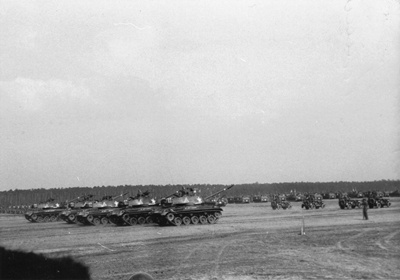
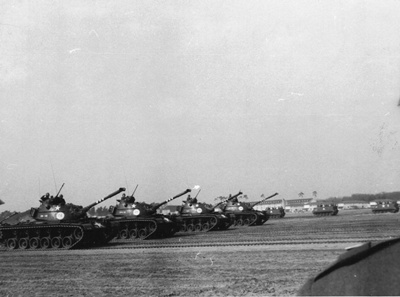
Cavalry
Pass
In
Review
Tanks Pass In
Review
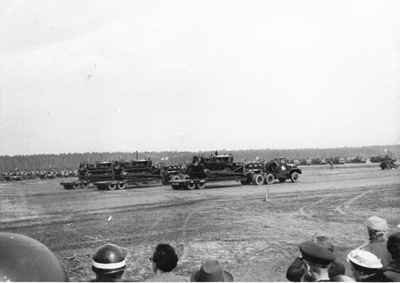 Engineers Pass In Review The next big
deal they had President Kennedy doing the
reviewing.
Most of us had not taken any leave since we got there in 1956. I was saving everything up so I could have a short leave to some country there before I went back to the states. I saved my money in soldier's deposits. Well, with so many people all wanting to have leave at the same time and only 15% could be out at any time, a list was drawn up and you had to put your name on a list and when the time came, you had to go, ready or not. Even then about 2 weeks was all you could do. I put May 1 down and got that date. Leave for 2 weeks starting May 1st, 1958. So, I went to Frankfurt in last part of April to get some money from soldier's deposits ........ you guessed it! 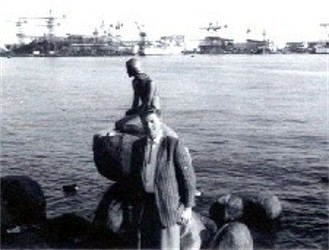 Couldn't get a damned dime. They wouldn't let me draw any out. I had to go through some big rig-a-ma-role to get any money. By the time I could get the money, it'd be too late and no guarantee leave would be available then, anyway. They advised me that I might be able to find a "German National" who would sign papers saying I owed him such and such money and he wanted it before I shipped out to USA - then the Army would give me the money to give him and so forth. I was just sick, couldn't borrow from my buddies, we'd be going our separate ways very soon, etc., couldn't go on leave, didn't want to involve a German in our affairs ......... so I just gave it up. After I had given the army what I thought was excellent service, they ......... well all under the bridge, now. That's my buddy Jim posing with Copenhagen's "Little Mermaid" on his leave in Denmark. So I started preparing to leave. One time when I was down at the Company's watering hole, I asked the woman who owned the place if she had a couple pictures I could remember them by. She went to their living quarters I guess was where she went and came back with these. When I asked for a picture, I had in mind something with her and some of her regular German customers in it. But when I looked at them I realized she had given me something even more valuable than what I had asked for. 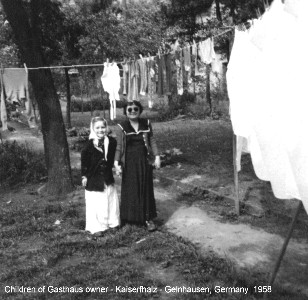
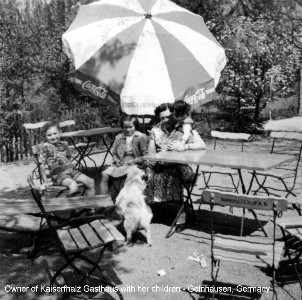 What could be more precious to a person than their children? I took them as I really felt
touched by her generosity. Over the years, I
always told my self that if I should ever go
back there, I would take those pictures along
and restore them to their family.
I probably should not have taken them in the first place but in the back of my mind, I think I wanted them so I could show American people what an evil German really looks like. 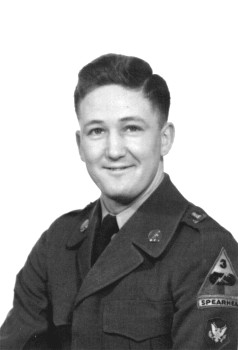 Getting down to the wire now, not
long and I'll be getting back on the boat. Getting down to the wire now, not
long and I'll be getting back on the boat. As you can see, I've put on a little weight. I was about 165 lbs when I went in and am about 185 lbs here. It must've been the good beer as the army food sure wasn't that good although I generally ate whatever they had. We got an awful lot of C and B rations. There for awhile we got 1ea Class A ration (meal) a day. The way we classified them was A ration was fresh food. B rations was c-rations in a big can and prepared in the messhall. C rations were the small individual cans and were the worst of the 3. Apparently the cans were emptied into a big pot in the messhall and prepared there and then, of course, we sometimes were issued individual C-Rations in the field. And we actually had some C-rations dated 1942-3, over 15 years old! Powered eggs almost every morning and like fare then one fairly good meal a day, generally chicken or beef. Lots of the army's old standby .... SOS. Those city boys ate it up. We were told the government, Eisenhower, had decreed that we had to use up all the aging c-rations from WWII. Now, I know they were driving to reduce costs in the mess because suddenly they had to cut the bread slices in half. The cooks would just stand a loaf on it's end and slice the loaf into diagonal halves the theory being a lot of people were not big bread eaters (understandable with American bread) and they might just take 3 half-pieces if they were cut rather than 2 whole pieces! It was the chintziest piece of bullshit I ever heard of and typical of general over-organizational bureaucracy. Other than that, it was a pretty good tour of duty - I learned a lot over there with some really good guys! I loaded up on the train in the last of June 1958 and headed for Bremerhaven embarkation point. We were warned about smuggling and so forth and cautioned about having all of our personal gear and that we had to have it to leave Germany. We couldn't be short uniforms, shoes, etc. Well, when we were on the train and about halfway there, the train made a stop at this one depot and some M.P. s came aboard the train and I kind of watched out my window and had clear view of the unfolding events. I couldn't see what happened when they got inside the car but they came out with some unfortunate asshole who was on the train and they were carrying a pair of boots and had the guy cuffed and by the elbow and took him right on, clear out of sight. I didn't recognize him and we were told he had stolen the boots. A lousy pair of boots and he was left in Germany. Hell, he could've bought them rather than steal them if he was short and afraid he'd be turned back at Bremerhaven for not having them. We got to Bremerhaven and guess what? THEY DID CHECK EVERYTHING to be sure we had it all. Then they let us load up on the ship. On the way back we had rough weather in the channel, stopped at South Hampton, England and picked up some Air Force guys then back in the channel and the rough seas. I started getting seasick and about that time they came around looking for KPs and picked me. Well, I was a Spec-3 and probably could have got out of it but I thought, what the hay, maybe it'll help me keep my mind off the ship's movements in the ocean and help with the queasiness, so I went. Worked out real well. I stood the KP for 2-3 days and was spelled off about the time we hit calmer seas and then had pretty good voyage the rest of the way. Dis-embarked and boarded a troop train and headed for Ft Sheridan, IL and finally got some decent food, fresh fruit and vegetables and all the cold milk we could drink, and I was mustered out on July 9, 1958. I had 64 days accumulated leave and they paid for 60 days and I lost 4 days because of the soldier's deposits thing. The year after I left, another celebrity hit the 3rdAD ....... Colin Powell! Yep, just a little kid LT right out of school in the first picture! 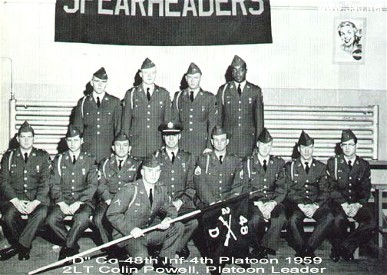
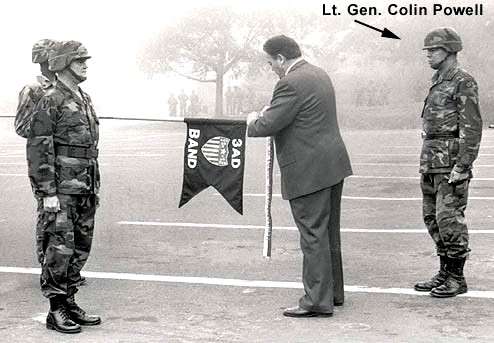 Now, what'da ya think of
that? He must've done more than one tour with
the 3rd AD. They were a really good
outfit and I'm positive that in 50 years more
good officers than are generally known served
with them - Powell was just one.
I don't know how well it's known but the M48 tanks used in the movie "Patton" came from the 3rd AD and were the very same tanks I crawled around over, banging my head against an unforgiving tank turret, feet sore from jumping off the damn things. The "Germans" had the M48s and the Americans had the M41 Tanks in the movie. I'd know'm anywhere. The army was upgrading their armor, got M60s which were diesel and had bigger gun and their old M48s were given to Spain and the movie was in the deal. Most of the German army people in the movie are played by the Spanish Army soldiers. I think Israel wound up with the rest of the old M48s. Good bye old friends, you helped me grow up. Then they de-activated the 3rd just as soon as they were done with Kuwait and Saddam. I just could not believe it. I considered them the best outfit in the Army but I guess they figured they don't need tanks any more even though they kept the 1stAD. Well, it's all history now ............. ADDENDUM: A couple years ago (2012?), a master sergeant emailed me saying he had seen this webpage and asked if I had information, pictures, whatnot about the 122nd Ordnance Battalion, that the 82nd Airborne was being re-organized and they were looking for new unit designation for the helicopter maintenance battalion being considered. He was involved in the organizing of the new unit so I gave him all the help I could, sent lots of info, etc. and would you believe? Yep! There is now a unit in the 82nd Airborne Division named 122nd Aviation Support Battalion and they use our old unit crest, shown in upper right corner of this page! 'Maintien Le Droit' is the motto. See ...... https://www.facebook.com/pages/122nd-Aviation-Support-Battalion/268200276649383?ref=stream The army went from tanks to air and the mechanics of today work on aircraft. I'm as proud of them as I can be, knowing our service legacy will live on in a good outfit. Ernie Conger Ernest E
Conger 7/7/2014
|